A Month Until #CES2026 – The Journey to Our Personal Health Operating Systems

In a month, I’ll board a plane for Las Vegas to spend a week at CES 2026, the annual electronics conference that last year brought together over 140,000 global technology stakeholders to display, demonstrate, and sell the latest in consumer-facing tech. This will be my fourteenth CES (including the virtually convened meeting held in 2021). If you want to time travel, here’s a link to an early CES post featuring “The Battle of the (Wrist)bands.” Indeed, the digital health aisle at the time had many wrist-worn activity trackers, largely amped-up pedometers, with the likes
Dr. Osterholm Explains “The Big One” – A Deja Vu Moment with a True North Public Health Expert
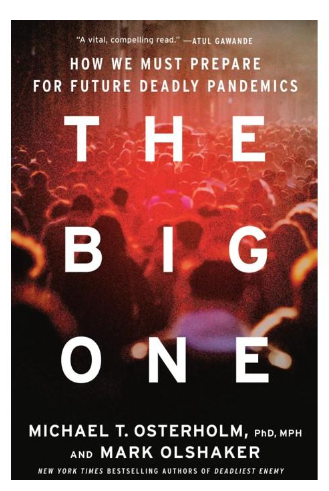
“The truism that no one is completely safe until everyone is safe is a truism because it happens to be true.” So caution Michael Osterholm, epidemiologist, professor at the University of Minnesota School of Public Health, and director of CIDRAP (the Center for Infectious Disease Research and Policy at the U-MN) and collaborating writer Mark Olshaker in their new book, The Big One. (In this post, for the sake of brevity, I’ll refer to the two authors as “O&O”). Simply put, the tagline tells us what we are about to read: a
To Garner Patient Loyalty, Focus on Convenience, Availability, and Affordability. Consumers Trust AI to Help the Journey.
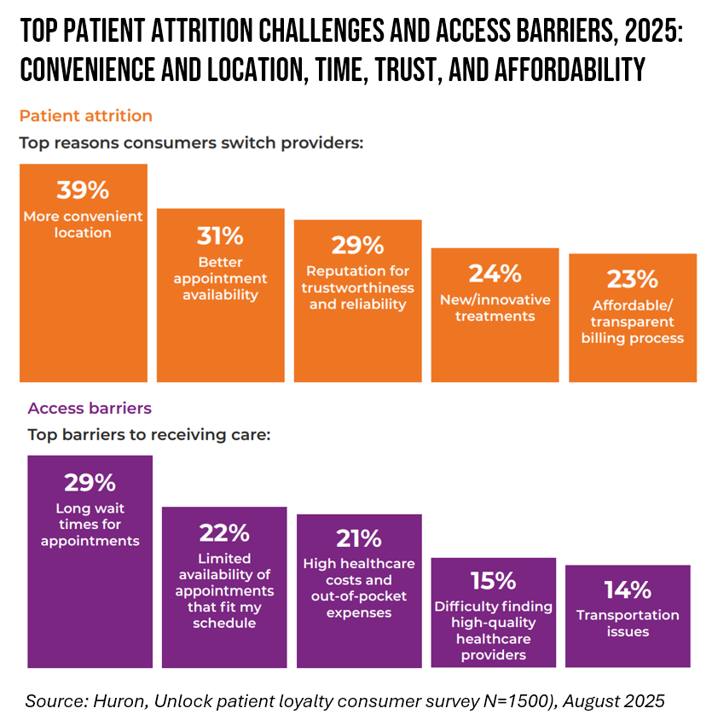
U.S. health consumers are roughly split 40/40 when it comes to AI analyzing personal health data to provide personalized advice, with 21% feeling neutral about that. But using AI for regular health updates and guiding us through a pre- or post-care medical journey would be welcome by one in two people, we learn in how to Unlock patient loyalty: New healthcare consumer insights, Huron Consulting Group’s consumer research report polling 1,500 U.S. healthcare consumers. Start with peoples’ top reasons for switching health care providers, along with main barriers preventing consumers from
What Children Can Teach Us About Using GenAI – Insights from The Alan Turing Institute and LEGO

“While children are the group that may be most impacted by the widespread deployment of generative AI, they are simultaneously the group least represented in decision-making processes relating to the design, development, deployment or governance of AI,” we learn in Understanding the Impacts of Generative AI Use on Children, research conducted by The Alan Turing Institute in partnership with the LEGO Group. But it’s the children who shared their perspectives who can teach adults about some potential positive and negative aspects of GenAI, and help inform us in managing downside risks. FYI, The Institute is headquartered in the British Library
Consumers Are Keen to Invest in Health and Well-Being – But Show Them the Evidence

Consumers around the world feel more invested than ever in what makes people feel both well and prosperous, we learn in the NielsenIQ Global State of Health & Wellness 2025 survey report. But there’s a trust deficit that must be healed in order for a health consumer to invest in services and products that feed health and well-being. NIQ fielded the survey research online in January and February 2025 among nearly 19,000 adults living in 19 countries: Brazil, Canada, China, the Czech Republic, France, Germany, Hungary, India, Indonesia Italy, Mexico, Netherlands, Poland, South Africa, Spain, Turkiye, UAE, United Kingdom, and
We Go Further Together: Calling for Collaborations, An Actionable Context for AHIP 2025

There are many ways to measure the dysfunction of health care in the U.S.: we can point to relatively poor incomes relative to the rest of the developed world, given how much money is allocated to health care in America. The maternal mortality rate in the U.S. is unconscionably high, akin to some middle- and lower-income nations in the world. And medical debt is a uniquely American form of financial toxicity compared with other OECD nations where the concept is, well, foreign. Even with these many failures, though, it’s important to put U.S. health care in a larger context: the
The Era of Healthcare Grievance: The Edelman Trust Barometer’s Take on Health and Trust in 2025

Health citizens globally are feeling and behaving more empowered with respect to their personal health from physical and mental health to social and environmental. Most people believe they can identify good sources of health information, with nearly one in two consumers 18-34 believing an average person can know as much as a doctor. But too many people feel unwell compared to how they felt during the pandemic, and most think major institutions are preventing them from accessing quality care and services which is resulting in an ethos of health care grievance. These
A Profile of Health Consumer-Generations’ Use of Digital Health – Rock Health Takes Us Through the Ages

In the past year, most consumers in the U.S. have used virtual care, tracked at least one health metric digitally, and own a wearable or connected health device. Digital health has certainly gone mainstream across U.S. consumers, with varying utilization and motivation by generation, we learn in the report, Screenagers to Silver Surfers: How each generation clicks with care from Rock Health. To segment health consumers by age/generation, the RH team mined the firm’s 10th Consumer Adoption of Digital Health Survey which polled over 8,000 U.S. adults in 2024 on peoples’ perspectives
What is a Consumer Health Company? Riffing Off of Deloitte’s Report on CHCs/A 2Q2025 Look at Self-Care Futures
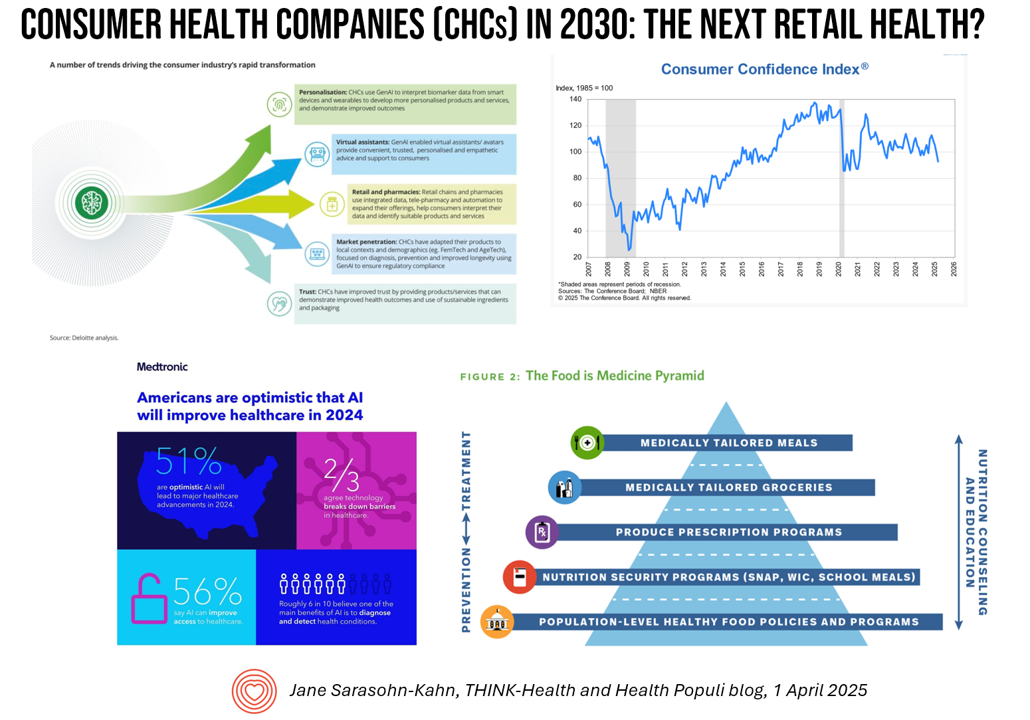
The health care landscape in 2030 will feature an expanded consumer health industry that will become, “an established branch of the health ecosystem focused on promoting health, preventing, disease, treating symptoms and extending healthy longevity,” according to a report published by Deloitte in September 2024, Accelerating the future: The rise of a dynamic consumer health market. While this report hit the virtual bookshelf about six months ago, I am revisiting it on this first day of the second quarter of 2025 because of its salience in this moment of uncertainties across our professional and personal lives — particularly related to
The Top Patient Safety Risks in 2025 Are Mostly About the “Human OS” – Reading ECRI’s Annual Report
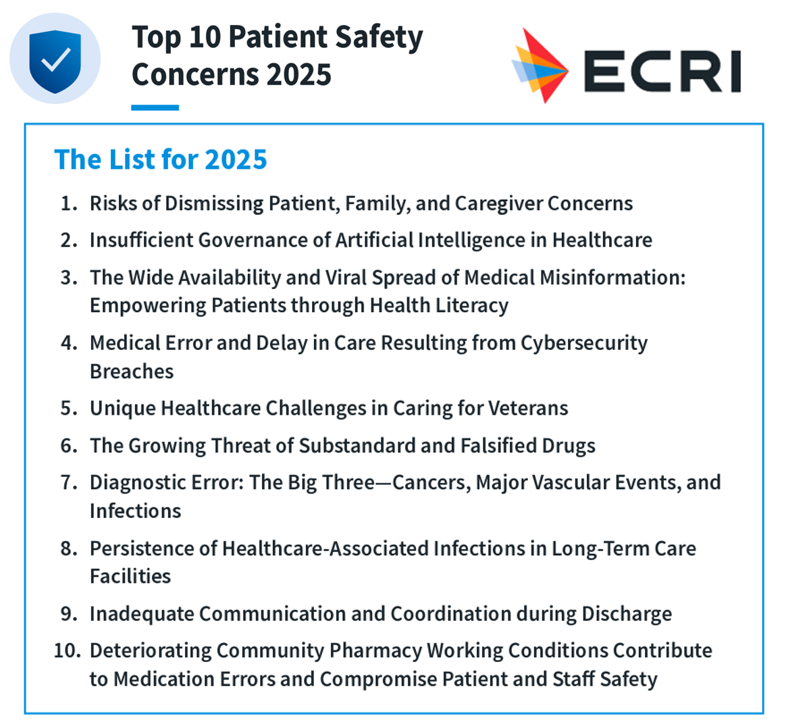
Each year, ECRI (the ECRI Institute) publishes an annual report on the Top 10 Patient Safety Concerns for the year. The 2025 list was published today. My read of it is that most of these risks have to do with what I’ve been referring to as the Human OS, the Human Operating System, in my talks and teachings. In this post, I’ll focus on 2 of the 10 most top-of-mind in my current workflow with clients and speaking: #1 and #3. Here’s the list of 10, calling out: Risks of dismissing
Think Quintuple Aim This Week at #HIMSS25
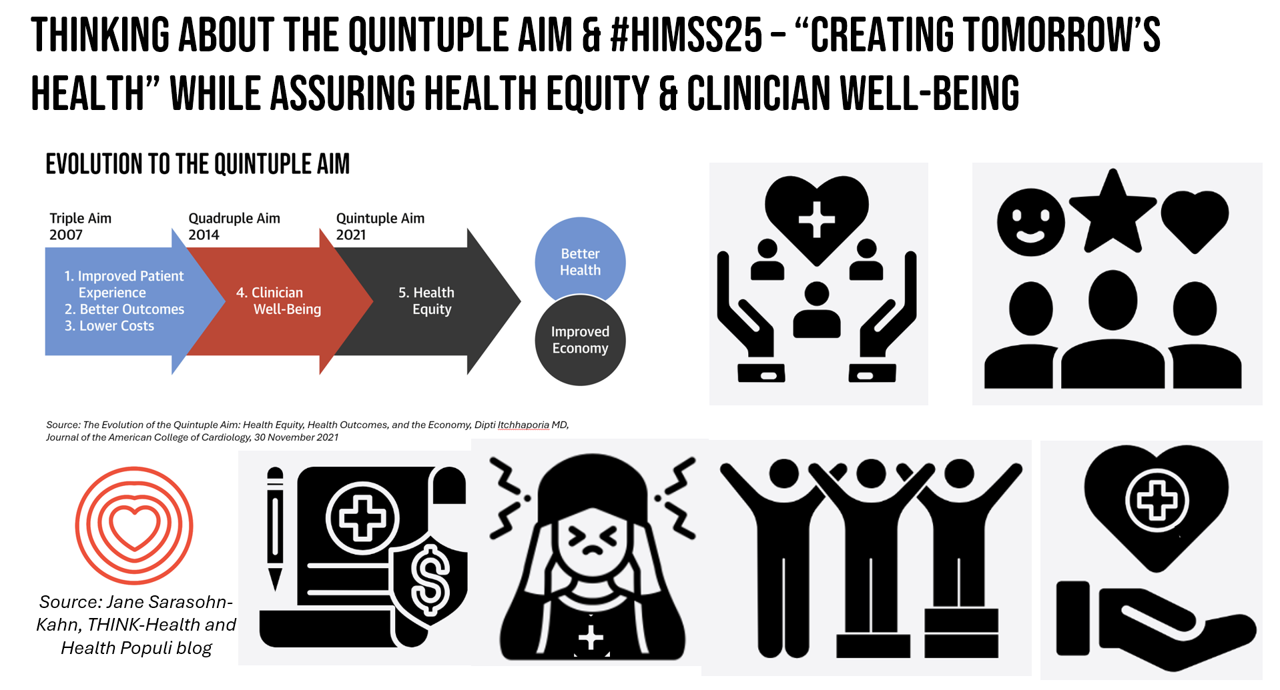
As HIMSS 2025, the largest annual conference on health information and innovation meets up in Las Vegas this week, we can peek into what’s on the organization’s CEO’s mind leading up to the meeting in this conversation between Hal Wolf, CEO of HIMSS, and Gil Bashe, Managing Director of FINN Partners. If you are unfamiliar with HIMSS, Hal explains in the discussion that HIMSS’s four focuses are digital health transformation, the deployment and utilization of AI as a tool, cybersecurity to protect peoples’ personal information and its use, and, workforce development. I have my own research agenda(s) underneath these themes
Telehealth, Right Here, Right Now: Calling on Congress to Vote for America’s Health and Well-being
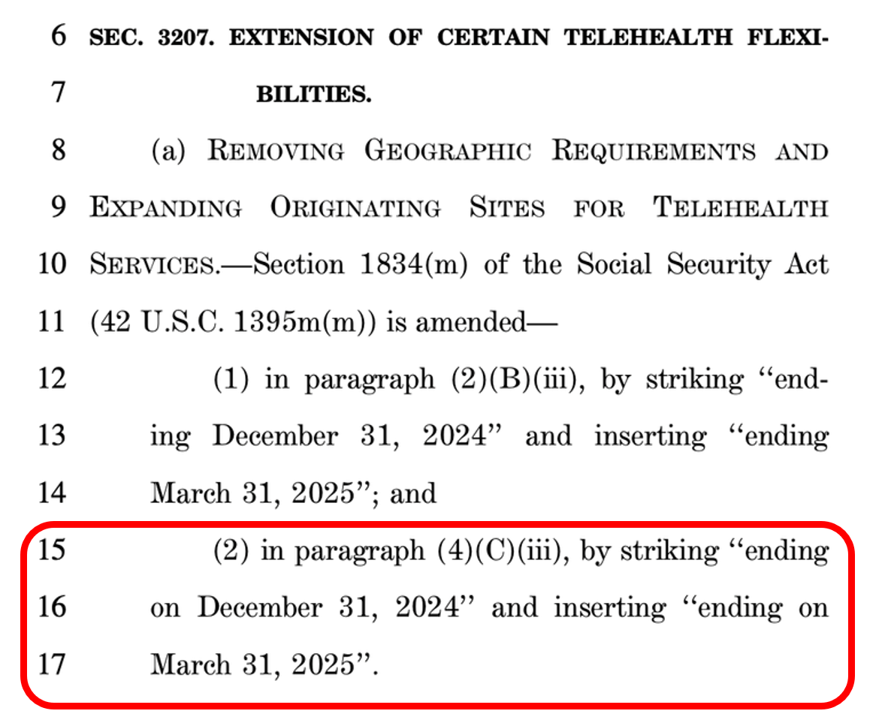
In the U.S., there are some issues that still unite most Americans in 2025. We can agree that, • The cost of eggs is too high • AI can be both exciting and promising at the same time as concerning • It sucks to have your personal data cyberattacked and breached, and, • Having access to telehealth is important. While I would be really sad to give up my omelets, I’m sticking a mindful toe into AI for some simple workflows, and I’m still dealing with the aftermath of the Change Healthcare data breach, it’s the looming telehealth deadline that’s
Physicians’ Confidence In and Use of AI is Rising, AMA Finds – Coupling Demand With Many Enabling Factors
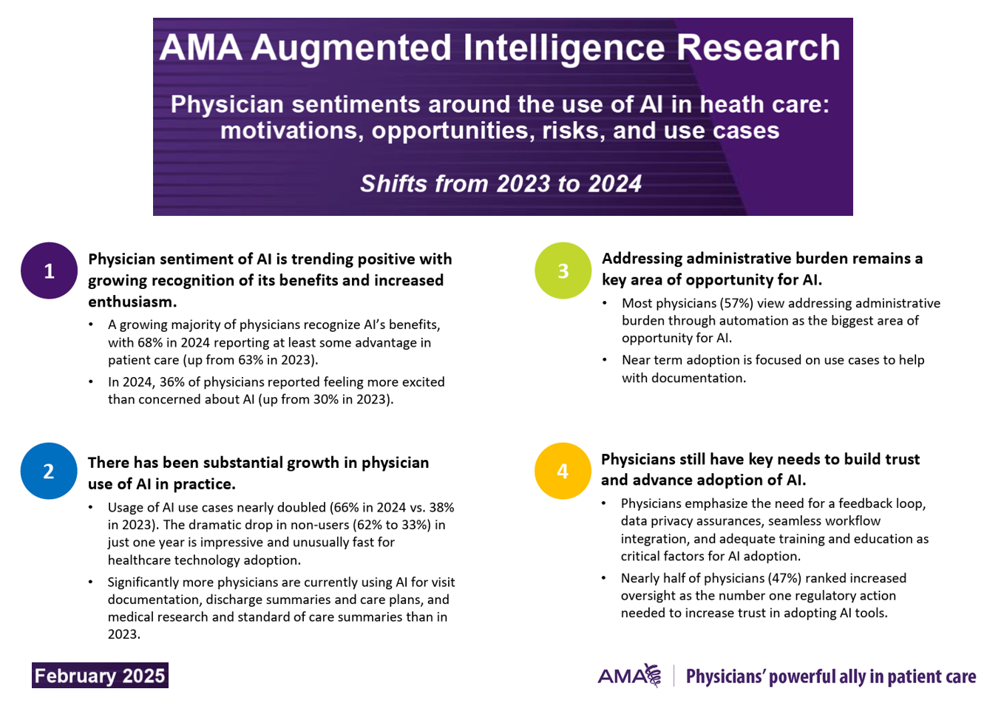
Doctors’ use of and demand for augmented intelligence in medical practice is on the rise — with many factors that could bolster or risk adoption on the journey toward AI in the doctor’s office, based on the latest survey from the American Medical Association (AMA) published this week. The AMA polled U.S. physicians in November 2024 to gauge their views on augmented intelligence (AI) addressing doctors’ use of AI, perceived opportunities and risks, and enabling factors for adoption. This study updates AMA’s survey conducted in 2023 and found significantly growing confidence and utilization
Some Bipartisan Concurrence on Health Care Issues in the U.S. – But Trust in Health Care Isn’t Bipartisan – KFF’s January 2025 Polls
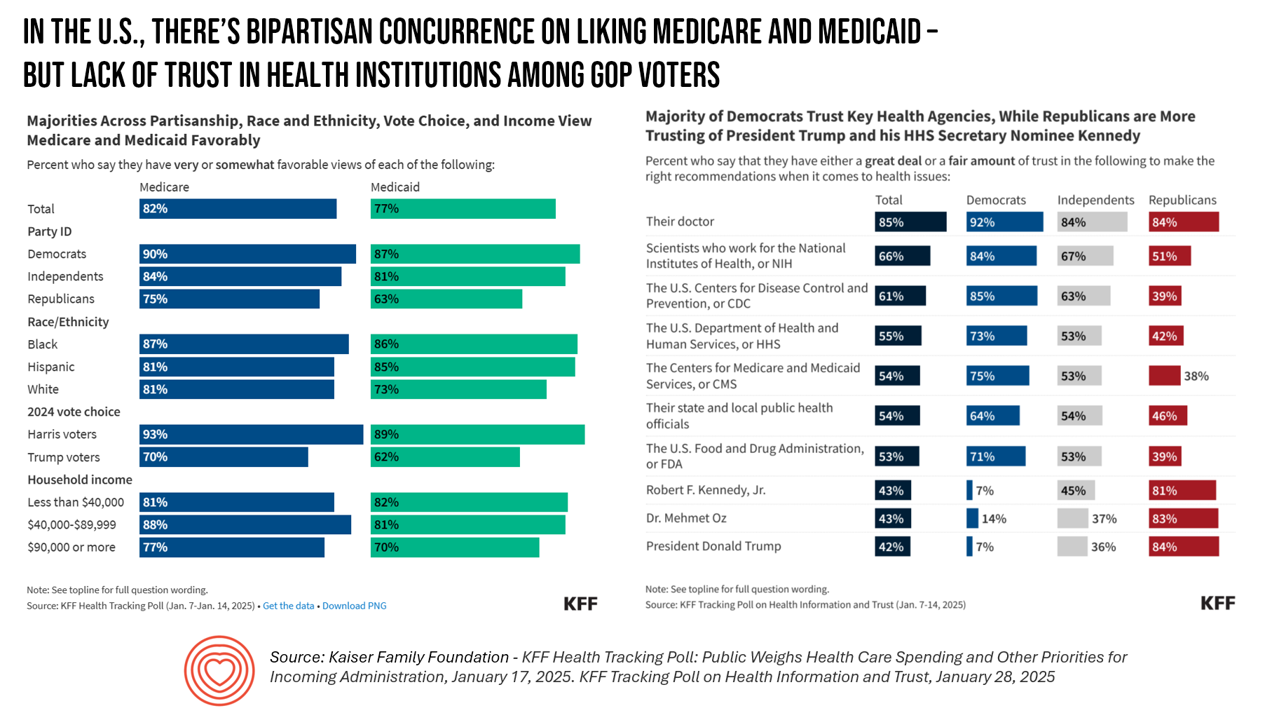
Two polls from one poll source paint at once a bipartisan and bipolar picture of U.S. health citizens when it comes to health care issues versus health care institutions in America. The Kaiser Family Foundation has hit the 2025 health policy ground running in publishing the January 2025 Health Tracking Poll last week and a poll on health care trust and mis-information yesterday. First, the health tracking poll which finds some concurrence between Democrats and Republicans on several big issues facing Americans and various aspects of their health care. As
The Rough Guide to Health/Care Consumers in 2025: The 2025 Health Populi TrendCast
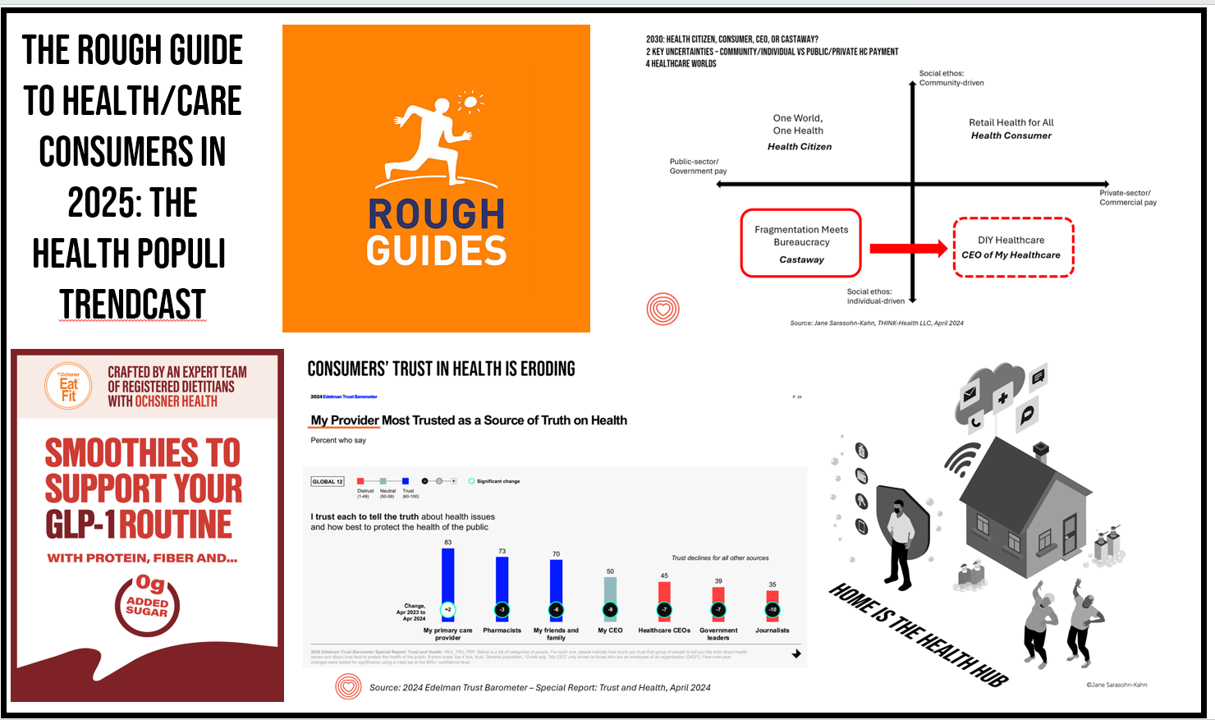
At this year-end time each year, my gift to Health Populi readers is an annual “TrendCast,” weaving together key data and stories at the convergence of people, health care, and technology with a look into the next 1-3 years. If you don’t know my work and “me,” my lens is through health economics broadly defined: I use a slash mark between “health” and “care” because of this orientation, which goes well beyond traditional measurement of how health care spending is included in a nation’s gross domestic product (GDP); I consider health across the many dimensions important to people, addressing physical,
Digital Divides and Disability – Ranking Health Determinants in a Digital Age: Learning from WHO and LSE
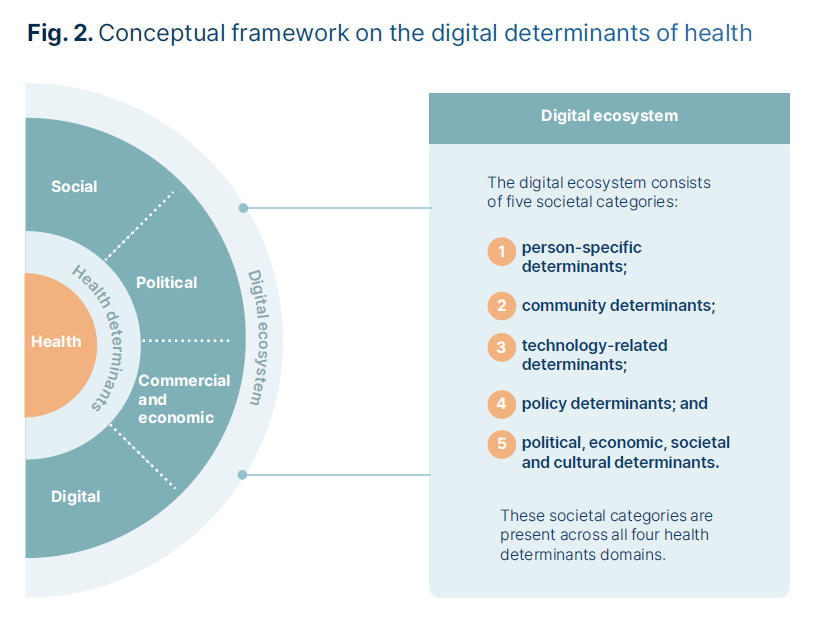
Among 127 health determinants, two rank highest: digital divides in the era of tech-enabled health and care: digital divides that shape a person’s political, economic, and social environment, and the person’s health/disability status. The digital transformation of health and care compel us to re-consider and re-frame social determinants of health in the “digital age,” which is what the World Health Organization in collaboration with the London School of Economics have done in research, published this week in the report, Addressing health determinants in a digital age. The report was funded by the European
Best Buy Health’s Latest Insights into Technology and Care at Home
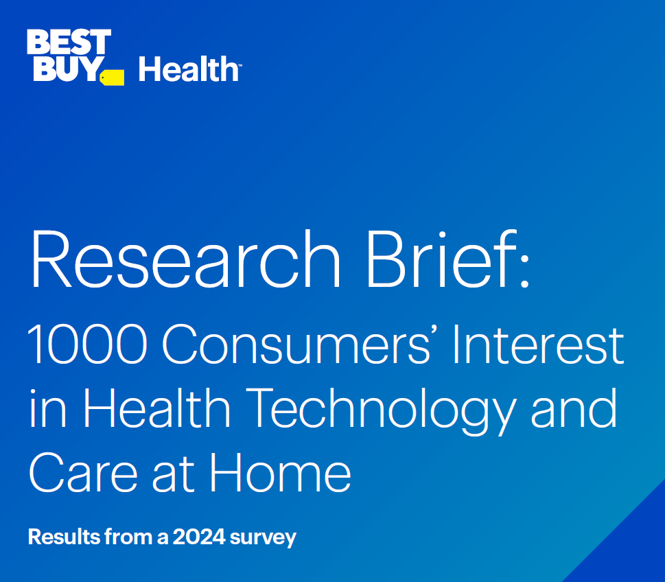
In the U.S., aging in and staying at home is a priority for most people over the age of 45 — and for nearly one-half of younger people between 18 and 44 — we learn in Best Buy Health’s Research Brief discussing the company’s survey of 1,000 U.S. consumers. Best Buy Health, the health-focused operation which is part of the electronics retailer Best Buy, worked with Sage Growth Partners to assess 1,000 U.S. consumers, 18 years and over, on their perspectives on health care, technology, aging in place, and caregiving. The research was fielded
Can AI Help to Improve Health Equity? U.S. Scientists Weigh In With “Yes,” Baking in Ethics and Accountability
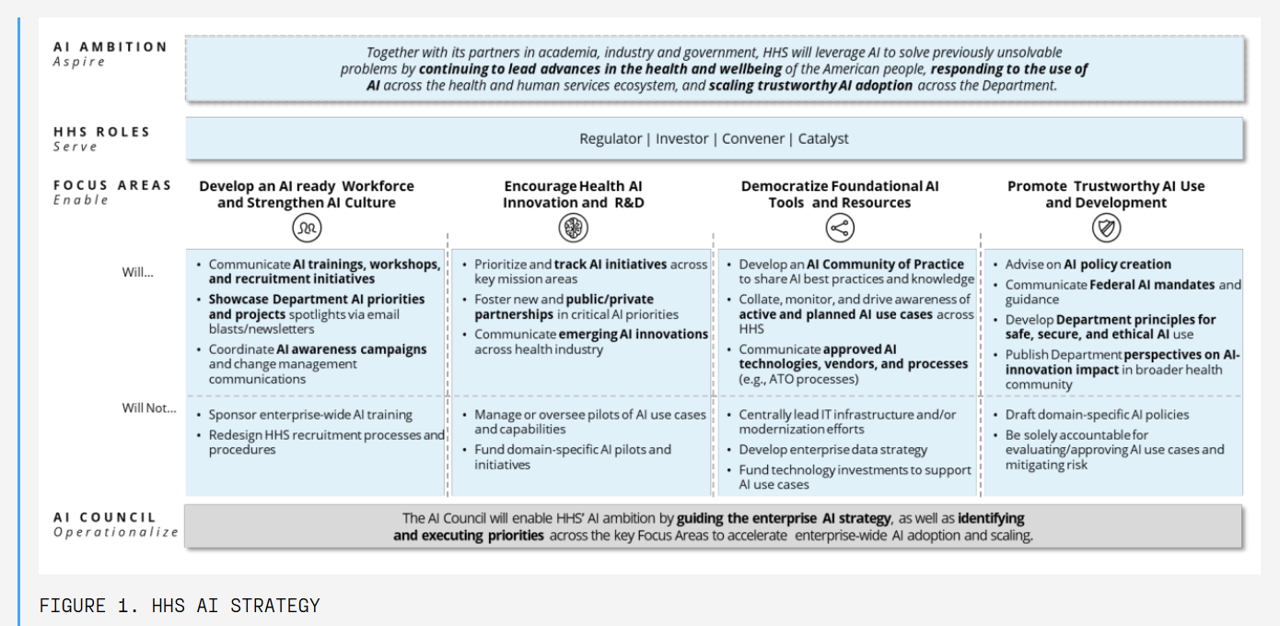
The Federation of American Scientists (FAS) was founded in 1945 by a group of scientists concerned about the atomic bomb — sharing a mission to focus on technology, science, and innovation to, in the Association’s words, “work toward a safer, more equitable, and more peaceful world.” Nearly 80 years after the organization’s launch, the FAS is focusing on the growing role of artificial and augmented intelligence across the many areas that touch peoples’ lives — including health care and well-being. The FAS published a state-of-the-nation essay on June 27 on Improving Health Equity Through AI.
“Listen to Me:” Personalization in Health Care Starts With Taking Patients’ Voices Seriously – the 15th Beryl Institute-Ipsos PX Pulse Survey
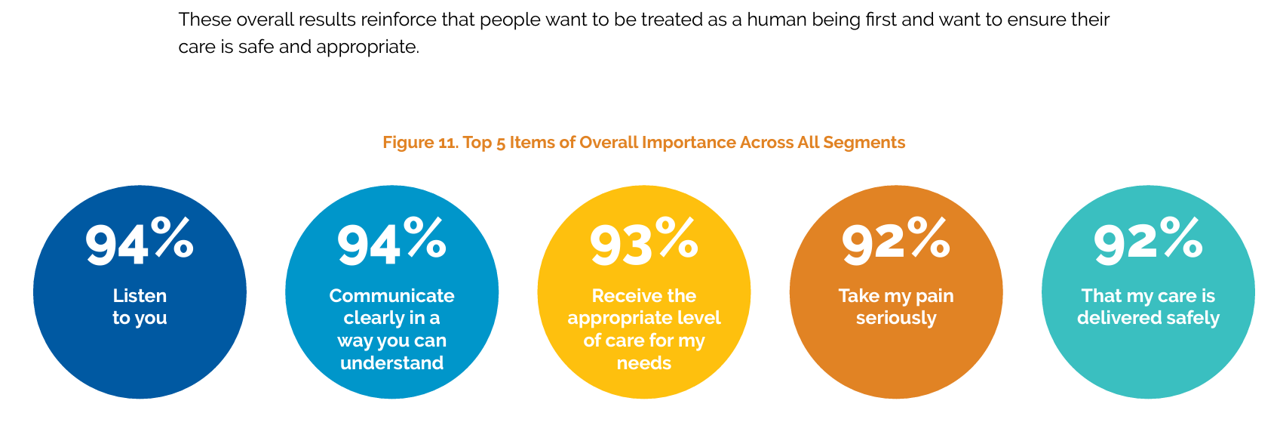
Patients’ experience with health care in the U.S. dropped to its lowest point over the past year, explained in the 15th release of The Beryl Institute – Ipsos PX Pulse survey. The study into U.S. adult consumers’ perspectives defined “patient experience” (PX) as, “The sum of all interactions, shaped by an organization’s culture, that influence patient perceptions across the continuum of care.” The survey was fielded by Ipsos among 1,018 U.S. adults in March 2024. Health care providers (and other industry stakeholders that go B2B or B2B2C (or P) are all thinking
Health Information Security – My Interview with Richard Kaufmann, CISO of Amedisys – Part 1: Origin Stories, the Security Ecosystem, and the Start Line

“If data is everywhere, how do you protect it?” This thought has been on my mind well before the Change Healthcare hacks (that’s plural) with which U.S. health care stakeholders are still dealing as this post goes live on the Health Populi blog. It’s a question posed to me in conversation with Richard Kaufmann, Chief Information Security Officer (CISO) with Amedisys. I’m grateful for the opportunity to explore in depth the many facets of cybersecurity in health care with Richard – the growing threats, the impact on providers, the state of technology and innovations to manage risks, and his evolving
Leveraging Trust, Showing Humility: How Health Care Organizations Can Serve Consumers – A New Read from McKinsey
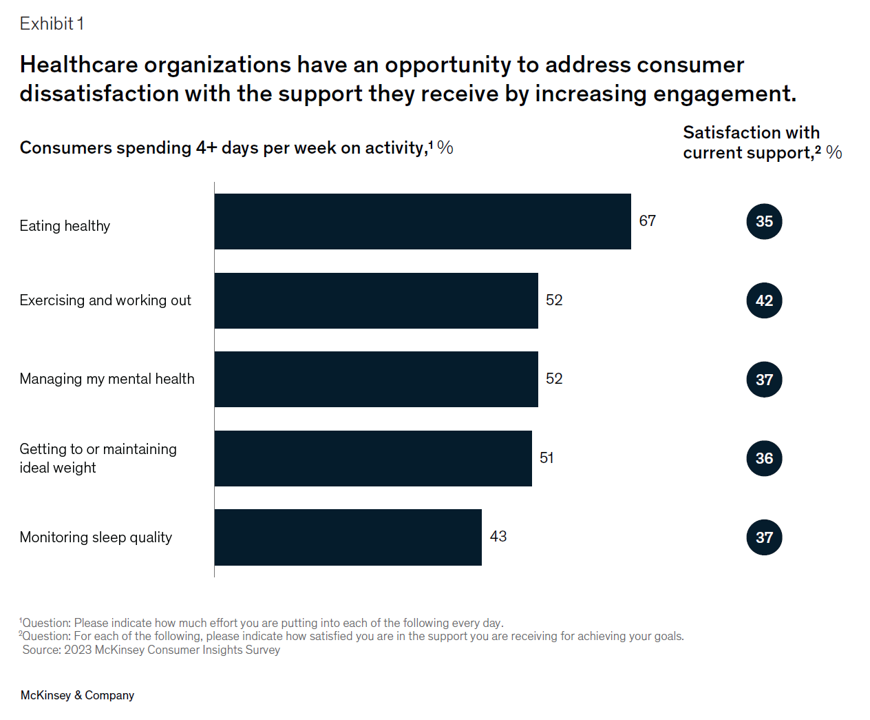
Three trends underpin health consumers’ evolving demands for service: spending more but getting less satisfaction and innovation; trusting health care with data but underwhelmed by the use of that personal information; and, growing “shopping” behavior seeking quality, availability, proximity, cost, and options across channels for health care. That’s the current read from McKinsey & Company’s team noting that Consumers rule: Driving healthcare growth with a consumer-led strategy. In this health consumer update, McKinsey spoke with three consumer marketing experts from other industries to learn best practices on how best to “be there”
Trust is a Superpower for Public Health – The 2024 Edelman Trust Barometer Through the Health Lens
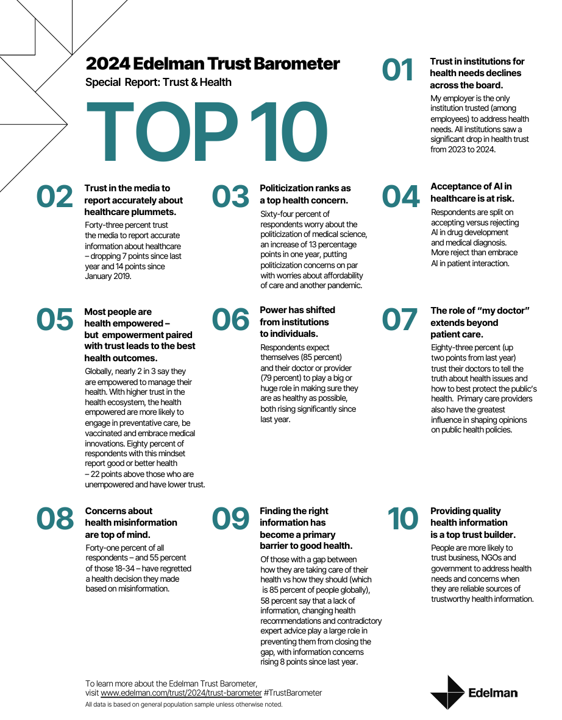
Less than 50% of people living in 16 countries do not trust government, media, or NGOs to do what is right to address their health needs and concerns, based on the responses from over 15,000 people living in 16 countries whose opinions are captured in the 2024 Edelman Trust Barometer’s Special Report on Trust and Health. Edelman launched the 2024 Trust Barometer earlier this year during the Davos World Economic Forum, and today released this round of research focused on health. Globally (among health citizens in the 16 countries polled in the study), trust for
Healthcare 2030: Are We Consumers, CEOs, Health Citizens, or Castaways? 4 Scenarios On the Future of Health Care and Who We Are – Part 2
This post follows up Part 1 of a two-part series I’ve prepared in advance of the AHIP 2024 conference where I’ll be brainstorming these scenarios with a panel of folks who know their stuff in technology, health care and hospital systems, retail health, and pharmacy, among other key issues. Now, let’s dive into the four alternative futures built off of our two driving forces we discussed in Part 1. The stories: 4 future health care worlds for 2030 My goal for this post and for the AHIP panel is to brainstorm what the person’s
Healthcare 2030: Are We Consumers, CEOs, Health Citizens, or Castaways? 4 Scenarios On the Future of Health Care and Who We Are – Part 1
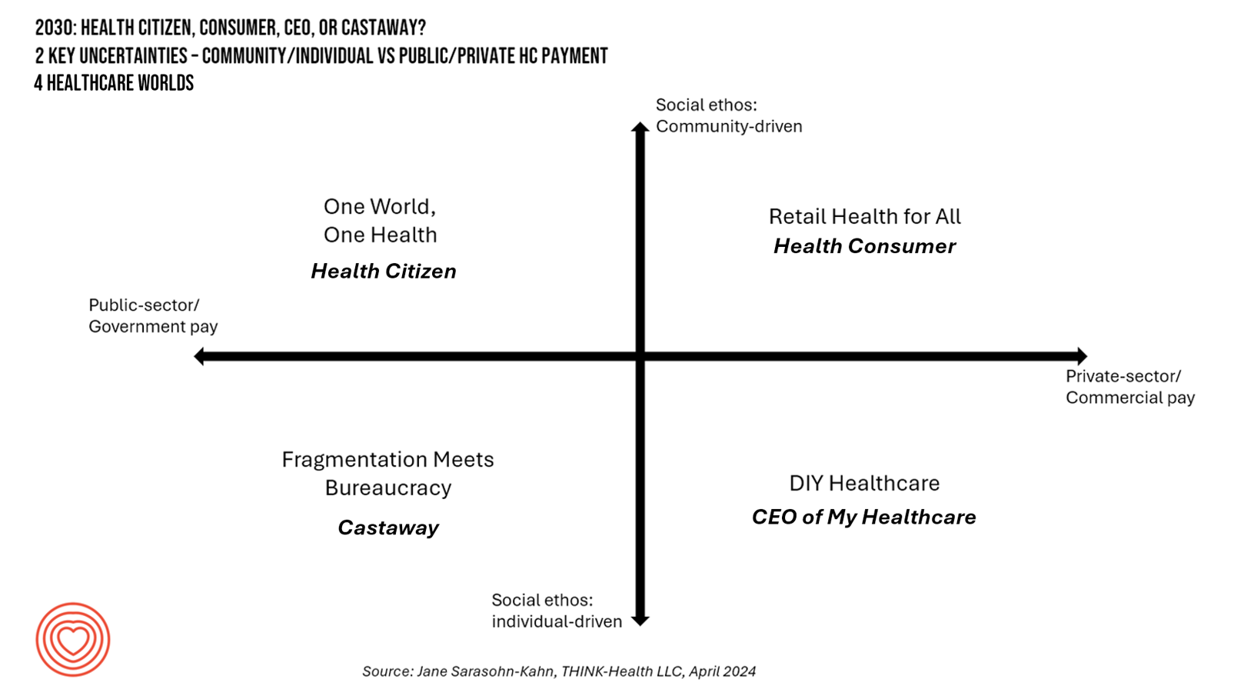
In the past few years, what event or innovation has had the metaphorical impact of hitting you upside the head and disrupted your best-laid plans in health care? A few such forces for me have been the COVID-19 pandemic, the emergence of Chat-GPT, and Russia’s invasion of Ukraine. That’s just three, and to be sure, there are several others that have compelled me to shift my mind-set about what I thought I knew-I-knew for my work with organizations spanning the health care ecosystem. I’m a long-time practitioner of scenario planning, thanks to the early education at the side of Ian
While Virtual Care is “Table Stakes” in Health Care, Consumers Are Growing More Protective About Data-Sharing
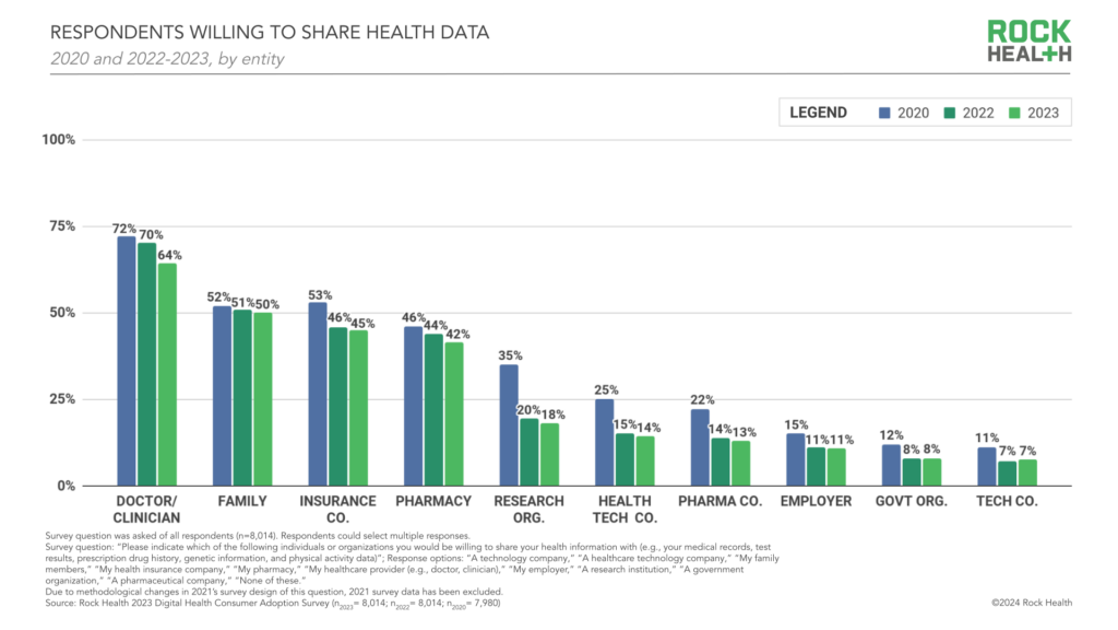
Three in four people in the U.S. have used virtual care, now, “Table-stakes…here to stay for patients and providers. However, that ubiquity comes with its own set of market pressures…shifting from pandemic-responsiveness to market- and consumer- responsiveness,” according to The new era of consumer engagement, Rock Health’s ninth annual Consumer Adoption Survey published 18 March. Convenience and waiting time are the top two reasons for choosing virtual over in-person care, Rock Health found. While virtual care is ubiquitous across the U.S. health care delivery landscape, patients-as-health care consumers are becoming more savvy and discriminating based
The Economic Contours of the Change Healthcare Cyber Attack: Taking Stock So Far
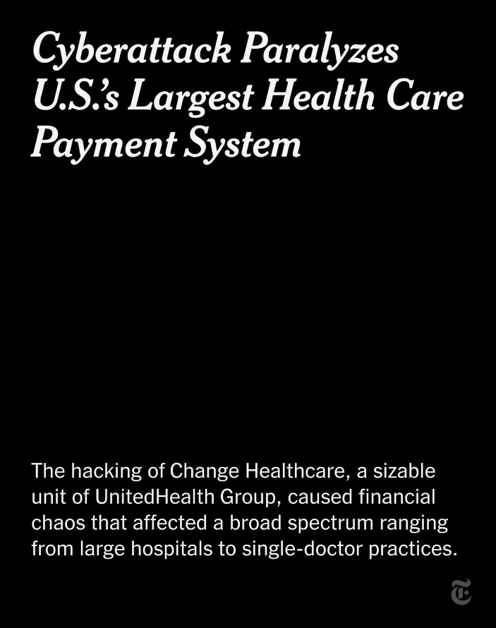
On February 22, 2024, I went to a CVS Pharmacy-Inside-Target in my community to fill a prescription for benzonatate 200 mg capsules. I had caught a bad case of the flu the week before, and subsequently suffered a very long tail of a cough. That’s TMI for me to write about in the Health Populi blog, but this story has a current-events twist: the pharmacist could not electronically link with my insurance company to transact my payment. He tried a few work-flows, and ended up using a discount card which in the moment worked for us, and I paid the
A Health Consumer Bill of Rights: Assuring Affordability, Access, Autonomy, and Equity
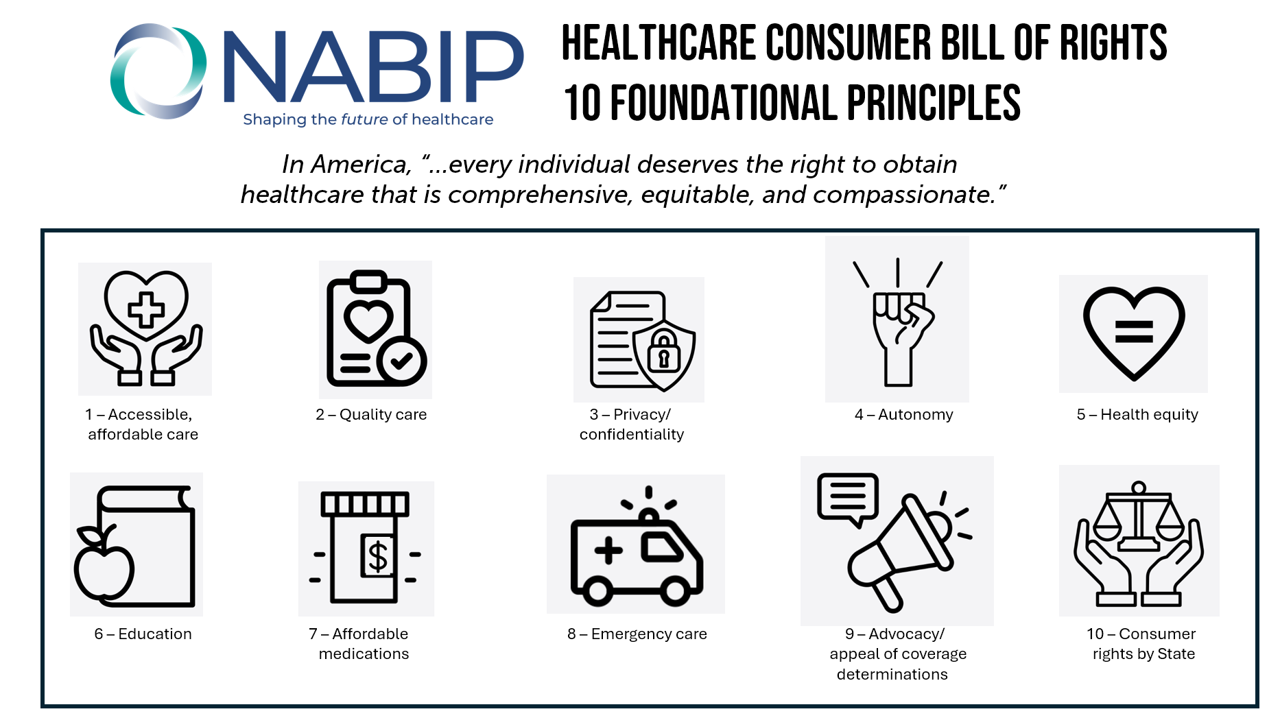
Let’s put “health” back into the U.S. health care system. That’s the mantra coming out of this week’s annual Capitol Conference convened by the National Association of Benefits and Insurance Professionals (NABIP). (FYI you might know of NABIP by its former acronym, NAHU, the National Association of Health Underwriters). NABIP, whose members represent professionals in the health insurance benefits industry, drafted and adopted a new American Healthcare Consumer Bill of Rights launched at the meeting. While the digital health stakeholder community is convening this week at VIVE in Los Angeles to share innovations in health tech, NABIP
Ethics for AI in Health – A View From The World Health Organization
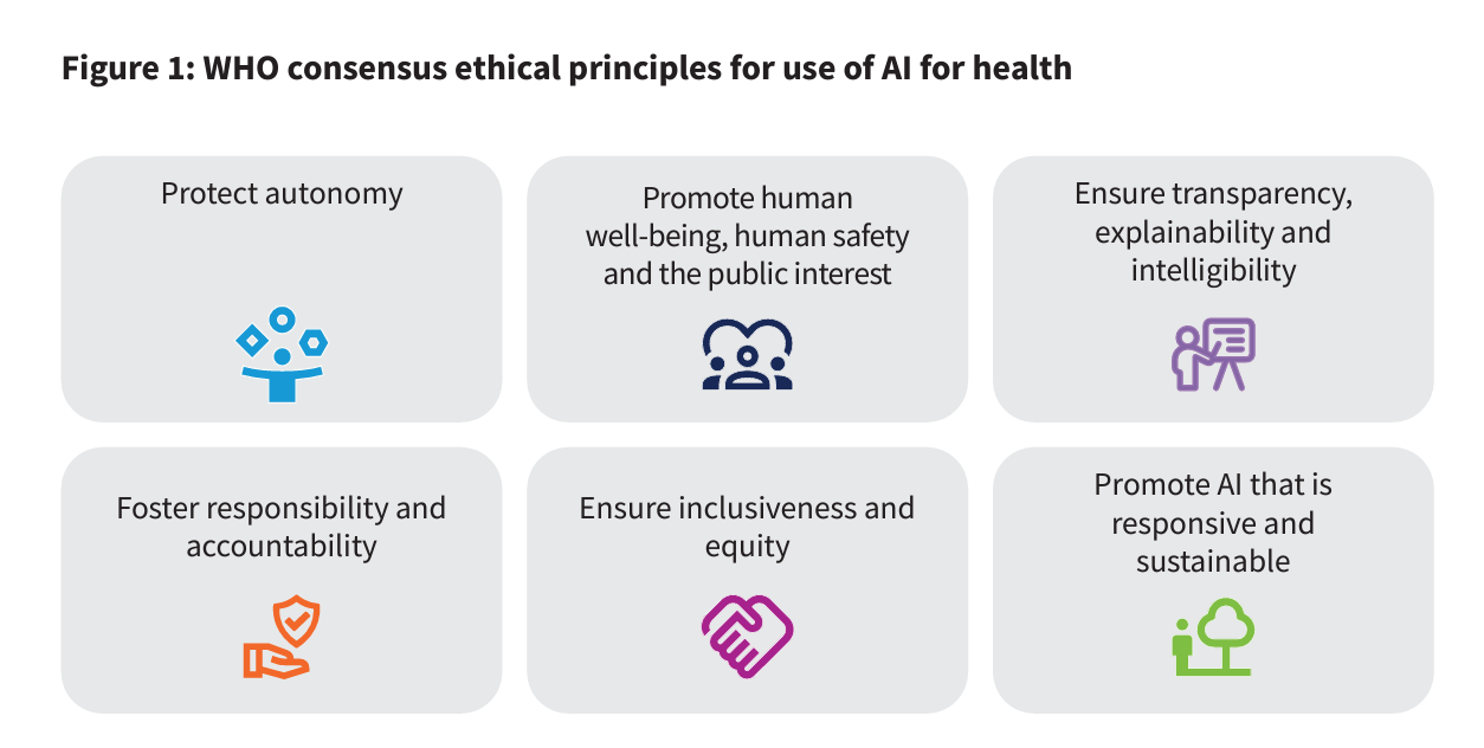
For health care, AI can benefit diagnosis and clinical care, address paperwork and bureaucratic duplication and waste, accelerate scientific research, and personalize health care direct-to-patients and -caregivers. On the downside, risks of AI in health care can involve incomplete or false diagnoses, inaccuracies and errors in cleaning up paperwork, exacerbate differential access to scientific knowledge, and exacerbate health disparities, explained in the World Health Organization’s (WHO) report, Ethics and governance of artificial intelligence for health. WHO has released guidance on the use of large multi-modal models (LMMs) in health care which detail 40+ recommendations for
Mainstreaming the Connected Life, with a Side of Trust — Insights from Capgemini at the Start of #CES2024
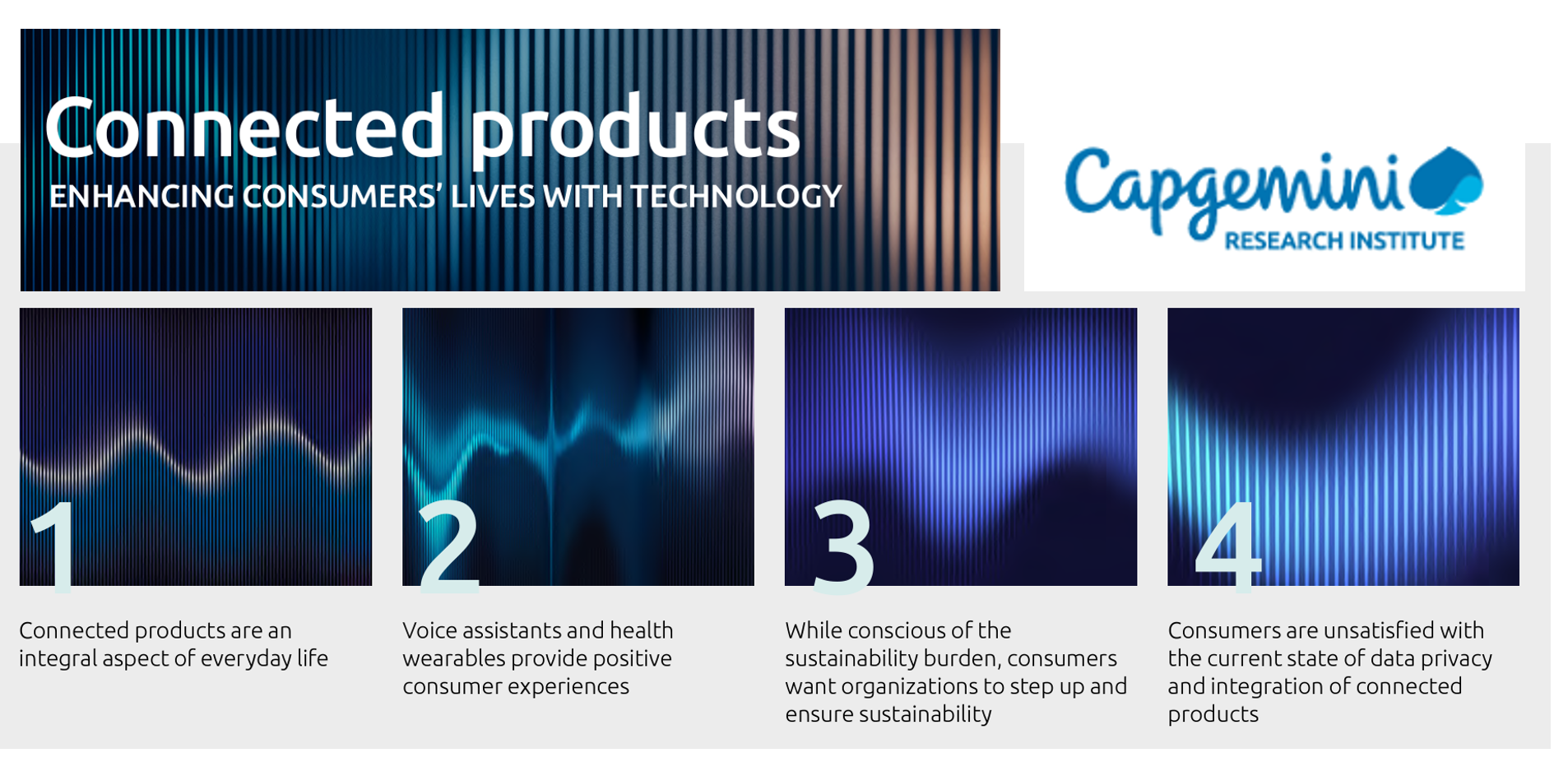
Even with serious concerns about personal data privacy and lack of integration, “connected products” are an integral aspect of peoples’ everyday lives. That’s the central thesis in a timely report from Capgemini Research Institute, Connected products: Enhancing consumers’ lives with technology. This study is well-timed as we begin a week-long exploration into the latest technology innovations being unveiled at CES 2024, the annual mega-conference hosted by the Consumer Technology Association (CTA). For the consumer research, Capgemini’s team polled the perspectives of 10,000 consumers age 18+ in November, among people from 13 countries: Australia, Canada, France, Germany,
“My Doctor’s Office” Should Accept Wearable Tech Health Data, Most Patients Say
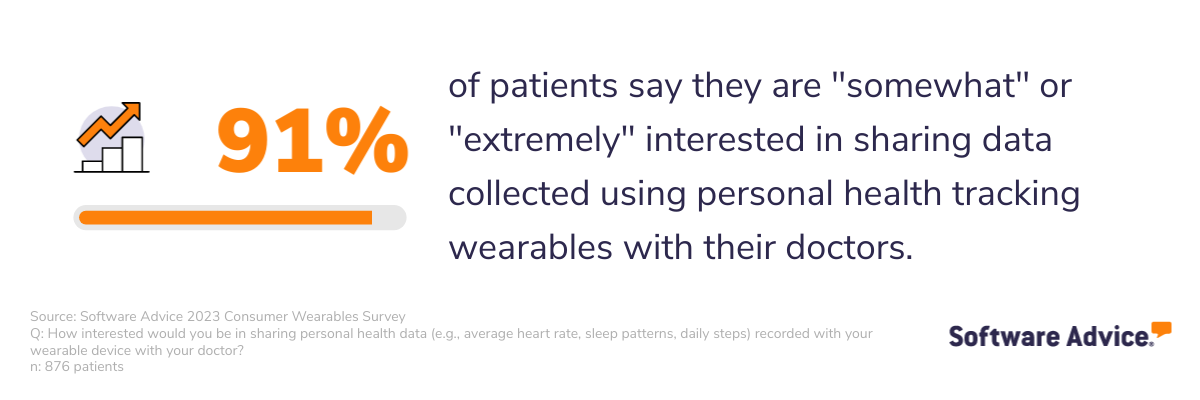
“Do personal health trackers belong in the doctor’s office?” Software Advice wondered. “Yes,” the company’s latest consumer survey found, details of which are discussed in a report published on their website. Unique to this study is the patient sample polled: Software Advice surveyed 876 patients in September 2023 to gauge their perspectives on wearable tech and health. Note that the patient sample was limited to consumers who had seen a health care provider in the past two years and who also owned and used a personal wearable health device such as an Apple Watch or Fitbit. Thus, the responses shared
The Elevator, Trust and the Data Commons: Bart de Witte Makes the Case for Open AI for Health at WHO/Europe
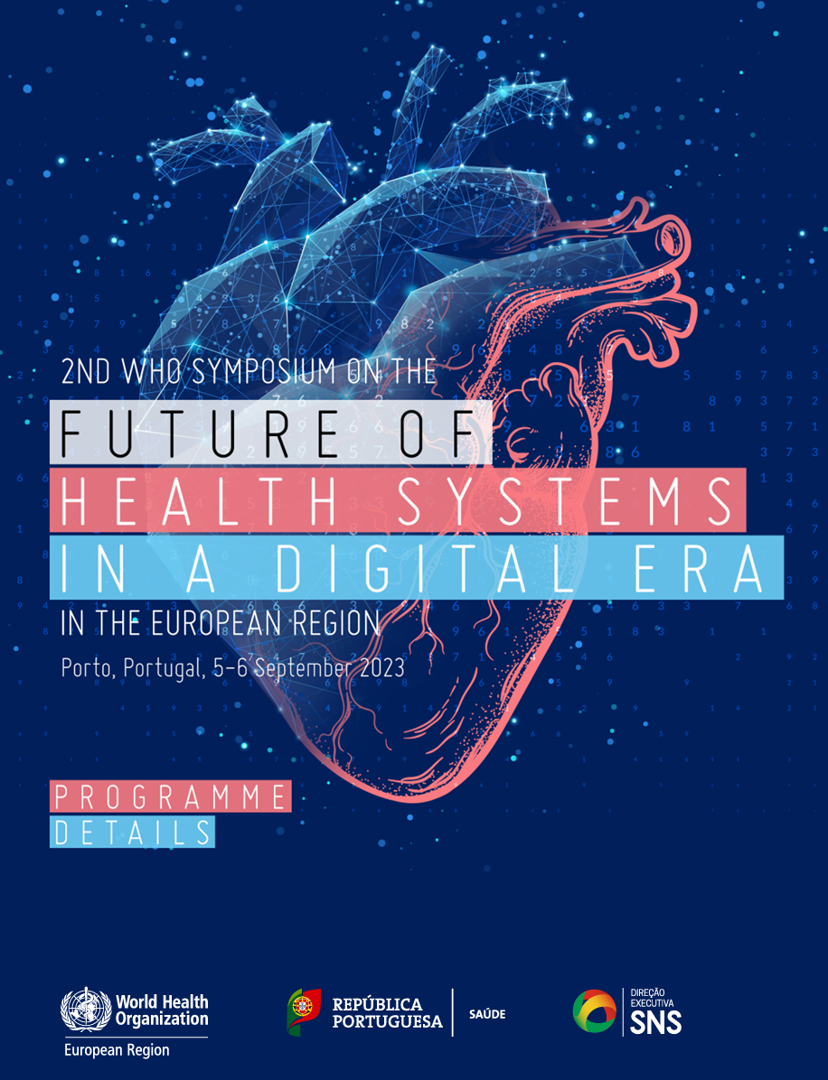
“I’m in Berlin, and we don’t like walls,” Bart De Witte responded in a concluding Q&A session yesterday at the 2nd Symposium on the Future of Health Systems, convened by the World Health Organization (WHO) in Porto on 5th September. Over two days, this meeting convened stakeholders focused on WHO’s European Region to support the Organization’s digital health action plan for 2023-2030 – which fosters cross-nation health planning covering the EU space. AI’s promise in health care to automate and streamline administration, and augment diagnosis and treatment, comes with accompanying risks that can
Patients Don’t Trust Big Tech with Personal Health Information Much Preferring Healthcare Providers as Data Stewards
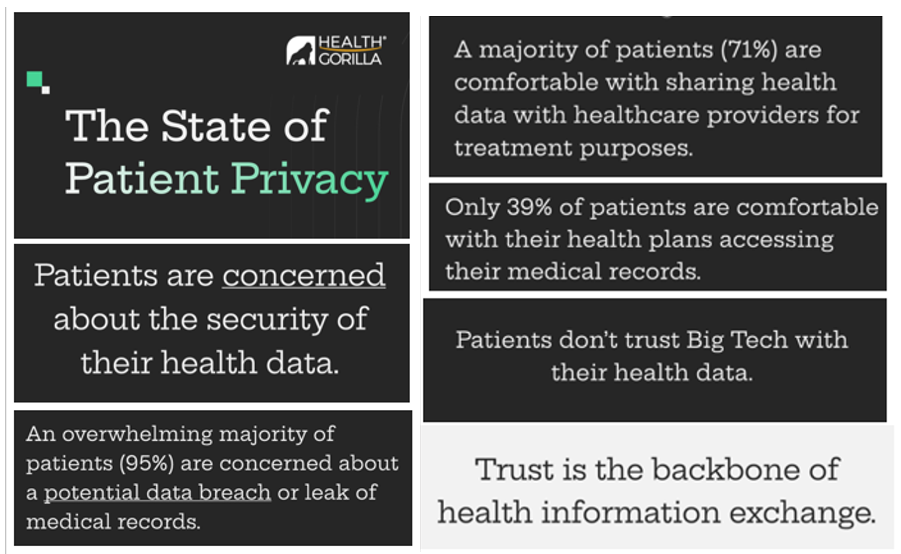
Nearly all patients are concerned about their medical records getting leaked or breached, which is The State of Patient Privacy, the title of a consumer study from Health Gorilla with a headline finding that “Patients don’t trust Big Tech with their health data.” With trust the “backbone” of health information exchange, Health Gorilla calls out, we have to face a big challenge here as health care enters its own sort of industrial revolution embedded AI and data analytics across the health/care ecosystem. How to re-build trust with the very technology that can help health care,
My Health, My Data – Thinking Consumers, Privacy and Self-Care at HIMSS 2023
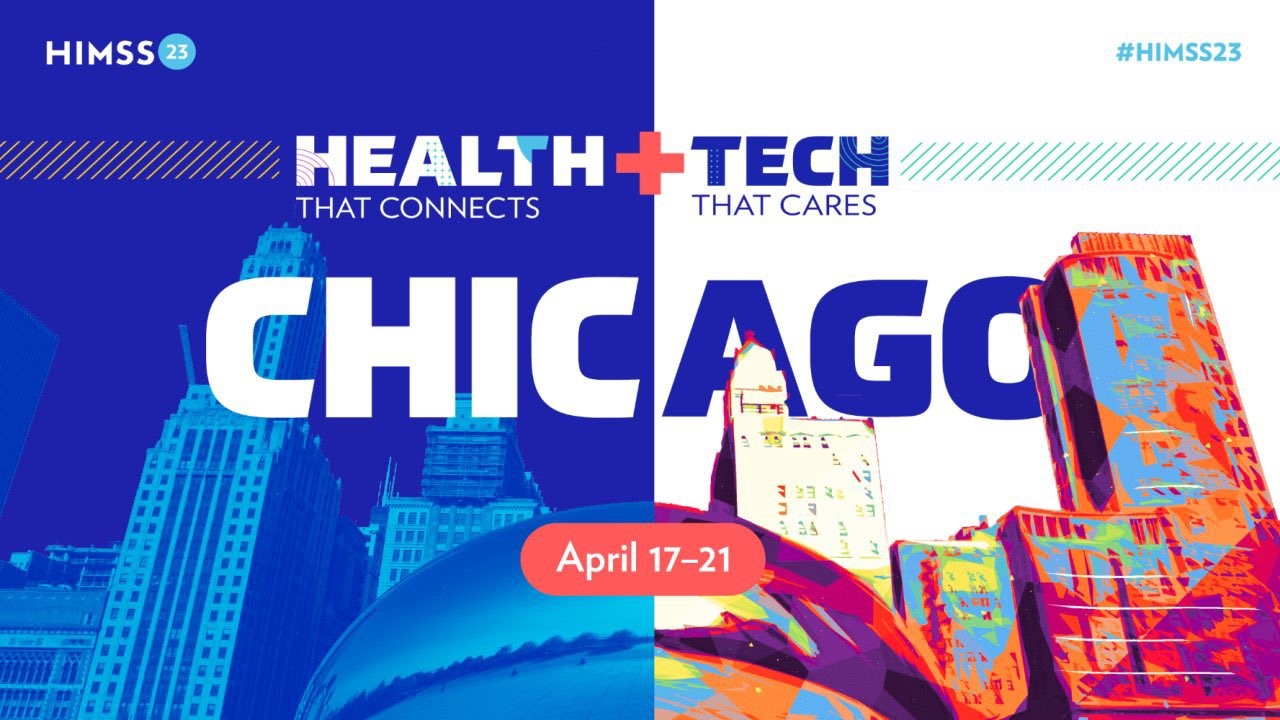
The Washington State legislature passed House Bill 1155, aka the My Health, My Data Act, last week. Governor Jay Inslee is expected to sign this into State law later this year. The bill expands privacy protections for Washington State’s health citizens beyond HIPAA’s provisions. The My Health, My Data Act defines “consumer health data” as “personal information that is linked or reasonably linkable to a consumer and that identifies a consumer’s past, present, or future physical or mental health.” The ethos of the name and the intent of this law is a perfect vision for
Wearable Tech for Health Tracking, Online Dating and Banking: Exploring the “Fluidity” of Peoples’ Data Privacy Views
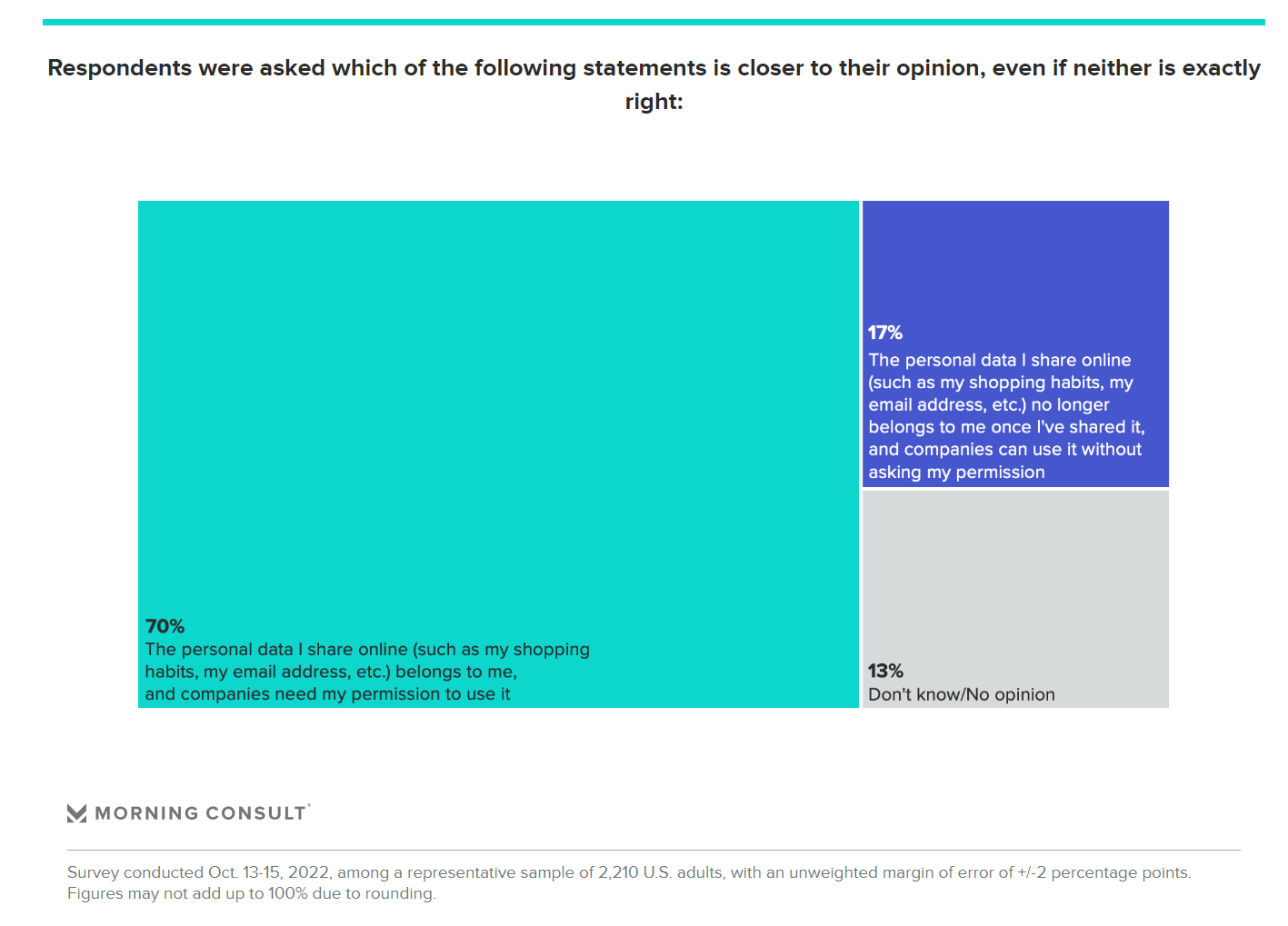
“The security of online data is the top consideration for consumers across many forms of online activities including email, search, social media, banking, shopping and dating”….and using health apps. A new poll from Morning Consult, explained on their website, explains that For Consumers, Data Privacy Has a Fluid Definition. Those privacy nuances and concerns vary by activity, shown in the first chart here from the study. For online banking, the most important consideration among most consumers (55%) is the privacy and security of their online data. Privacy and security of personal data was
Consumers’ Blurring Digital Worlds of Health, Learning, Shopping, and Living
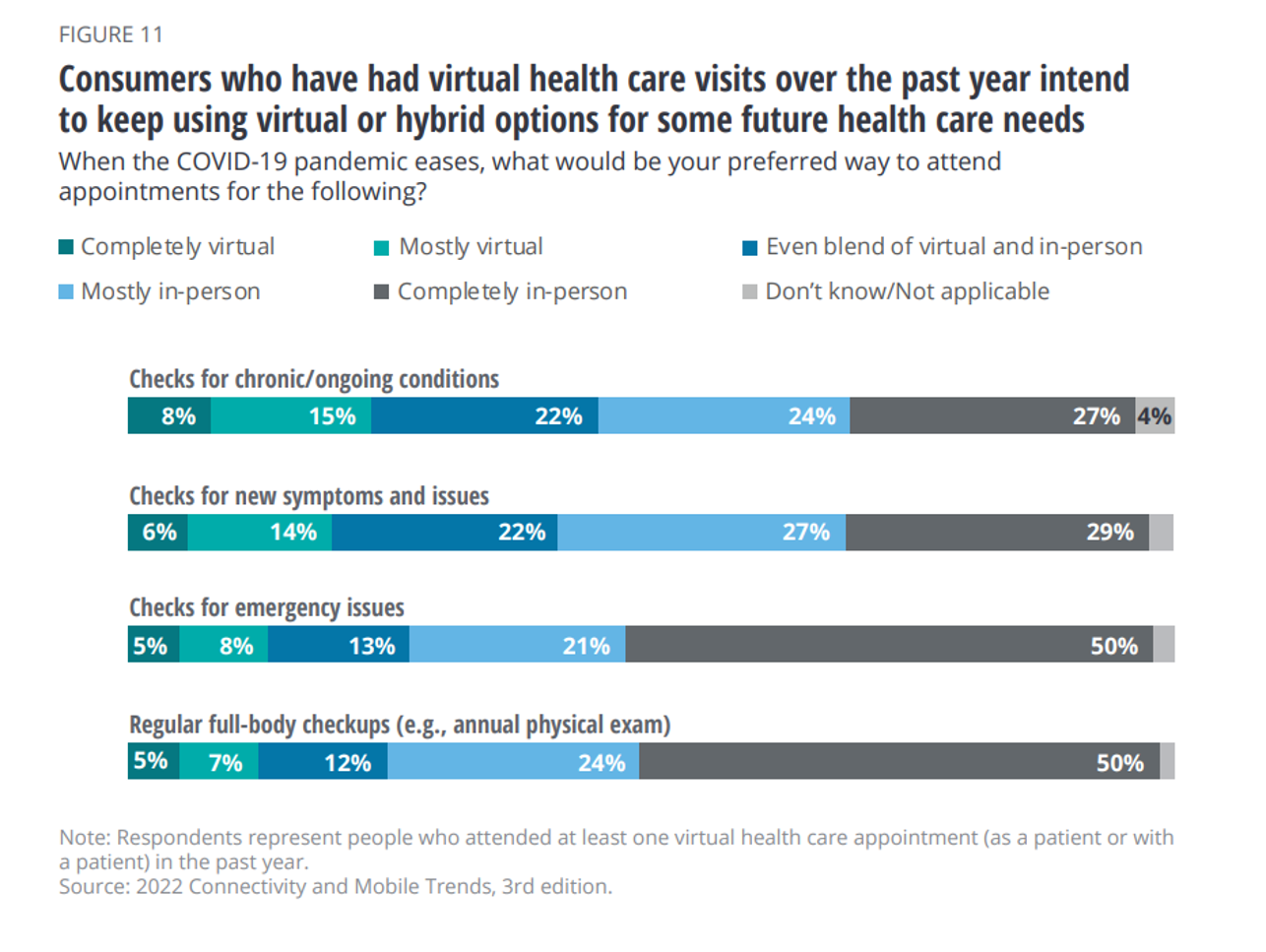
“Almost overnight, lines blurred between consumers’ physical and digital worlds, and home became the headquarters for virtual working, learning, fitness, health care, shopping, socializing, and entertaining.” That blur has reshaped peoples’ Everyday Normal we learn in Mastering the new digital life from Deloitte, a survey conducted among 2,005 U.S. consumers in the first quarter of 2022. The report is part of Deloitte’s ongoing Connectivity and Mobile Trends research in this third iteration. The report covers peoples’ new digital transformations for work, school and health; in this post, I’ll focus on the last element,
The Retail Health Battle Royale, Day 5 – Consumer Demands For a Health/Care Ecosystem (and What We Can Learn from Costco’s $1.50 Hot Dog)
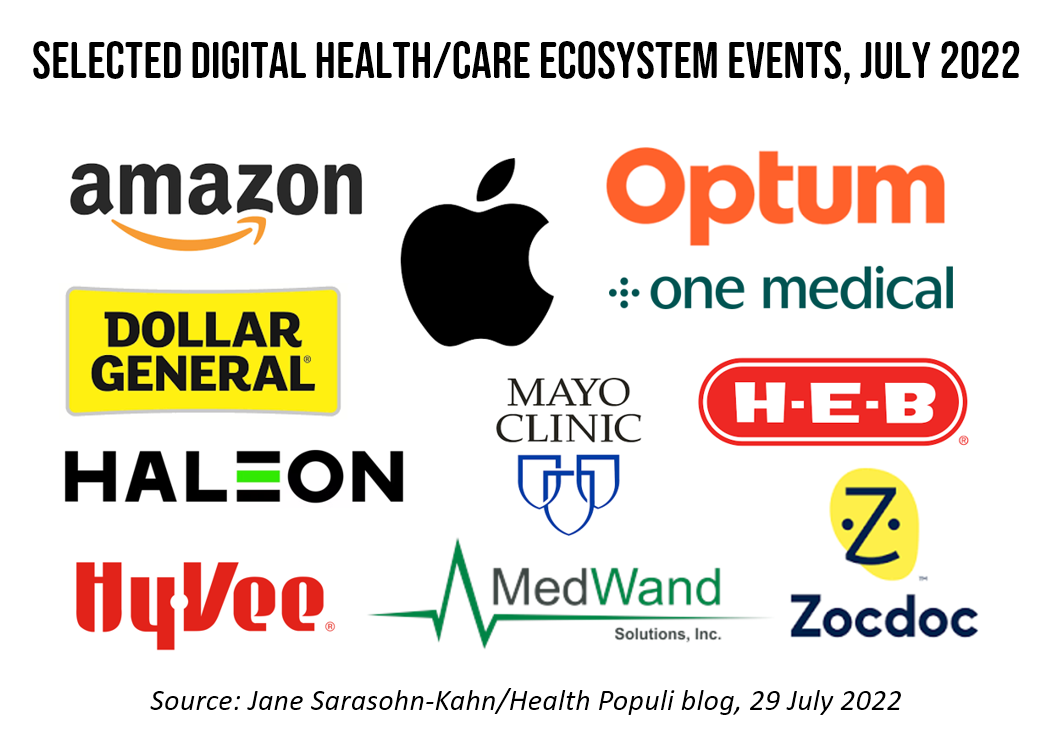
In another factor to add into the retail health landscape, Dollar General (DG) the 80-year old retailer known for selling low-priced fast-moving consumer goods in peoples’ neighborhoods appointed a healthcare advisory panel this week. DG has been exploring its health-and-wellness offerings and has enlisted four physicians to advise the company’s strategy. One of the advisors, Dr. Von Nguyen, is the Clinical Lead of Public and Population Health at Google….tying back to yesterday’s post on Tech Giants in Healthcare. Just about one year ago, DG appointed the company’s first Chief Medical Officer, which I covered here in
The Retail Health Battle Royale in the U.S. – A Week-Long Brainstorm, Day 3 of 5 – Apple as “Intelligent Health Guardian”
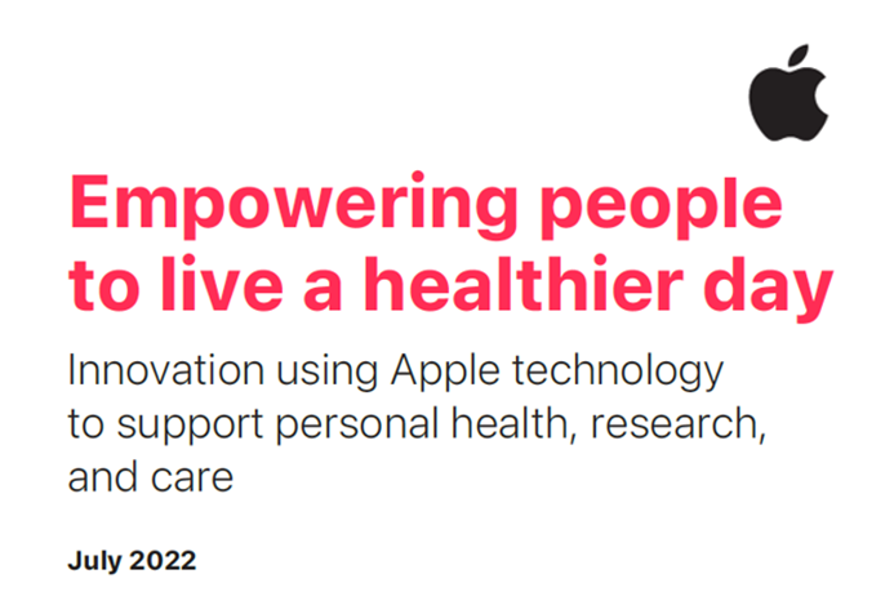
Apple wants to be your “intelligent guardian for health,” based on a 60-page paper shepherded by Jeff Williams, the company’s Chief Operating Officer. Published last week, the paper is one of the big signals trumpeted this U.S. summer marked by the BA.5 omicron subvariant of SARS-CoV-2, inflation pressures on our household budgets, social/political tensions, and hot-hot weather. I’m folding the report into my coverage this week on the Retail Health Battle Royale today, Day 3 of my week-long series updating us on the health/care ecosystem. For the previous two days’ posts, see… Day 1
The Reluctance of Consumers to Share Personal Information – The Challenge of Data for Health “Blurring”
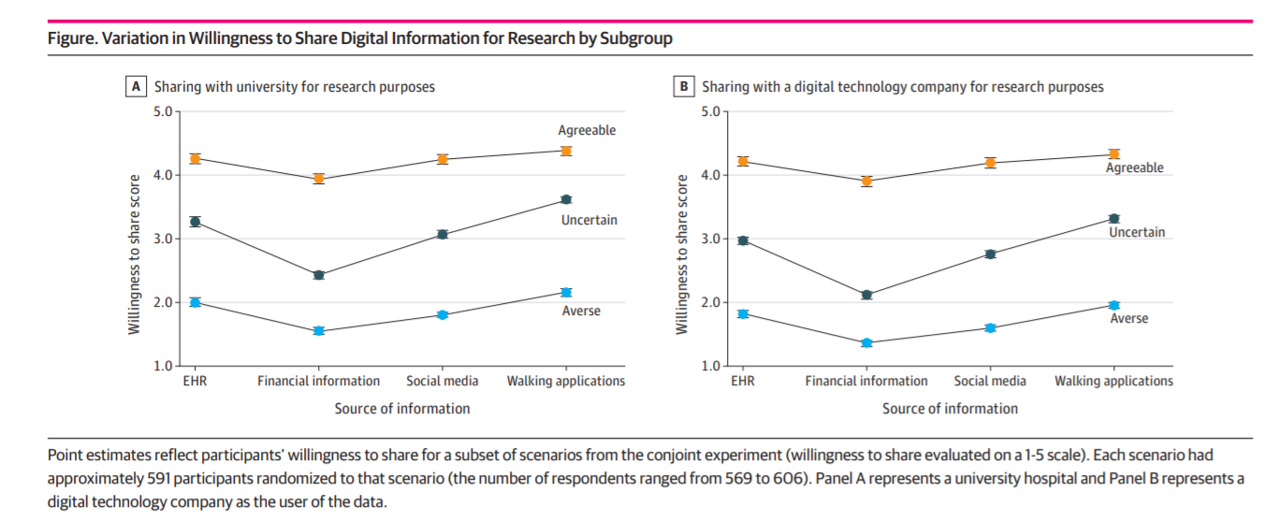
Health is the cornerstone to our core needs, thereby the cornerstone to trust.” This was one lens on the latest 2022 Edelman Trust Barometer published earlier this month. But trust is in short supply when it comes to consumers openness to share their personal information we learn through a new study published in JAMA, Consumer Willingness to Share Personal Digital Information for Health-Related Uses. For some historical context, the authors (all affiliated with the University of Pennsylvania [medical school or Wharton (business school)] start with HIPAA, the Health Insurance Portability and Accountability Act which served up privacy protections based on
Mental Health at CES 2022 – The Consumer’s Context for Wellbeing in the New Year
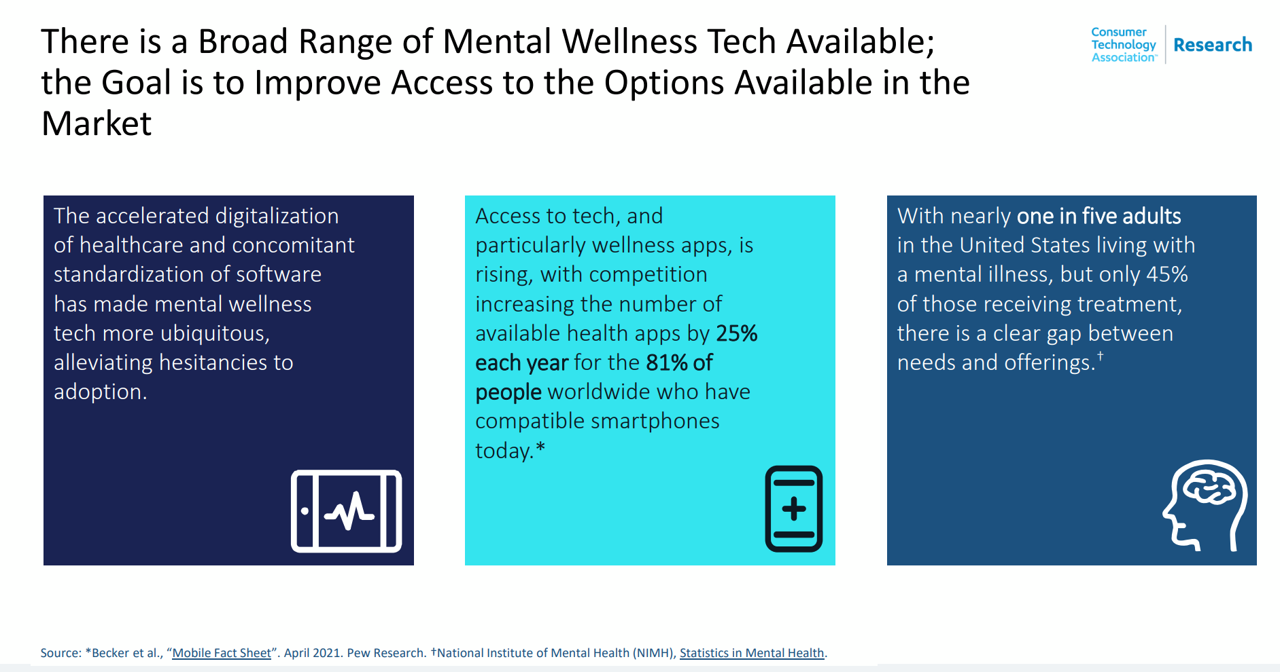
As we enter COVID-19’s “junior year,” one unifying experience shared by most humans are feelings of pandemic fatigue: anxiety, grief, burnout, which together diminish our mental health. There are many signposts pointing to the various flavors of mental and behavioral health challenges, from younger peoples’ greater risk of depression and suicide ideation to increased deaths of despair due to overdose among middle-aged people. And about one-in-three Americans has made a 2022 New Year’s resolution involving some aspect of mental health, the American Psychiatric Association noted approaching the 2021 winter holiday season. Underneath this overall statistic are important differences across various
Health Care Planning for 2022 – Start with a Pandemic, Then Pivot to Health and Happiness
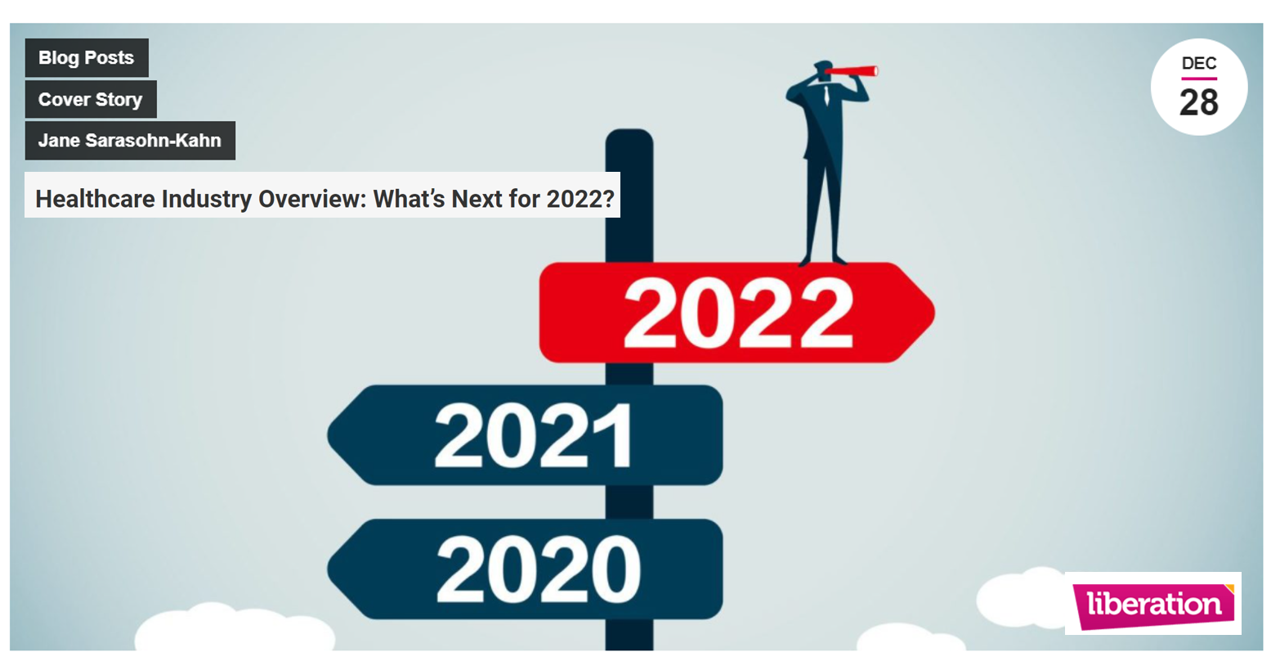
One of my favorite Dr. Seuss characters is the narrator featured in the book, I Had Trouble In Getting to Solla-Sollew. I frequently use this book when conducting futures and scenario planning sessions with clients in health/care. “The story opens with our happy-go-lucky narrator taking a stroll through the Valley of Vung where nothing went wrong,” the Seussblog explains. Then one day, our hero (shown here on the right side of the picture from the book) is not paying attention to where he is walking….thus admitting, “And I learned there are troubles of more than one kind, some come from
Health Consumers, Health Citizens, and Wearable Tech – My Chat with João Bocas
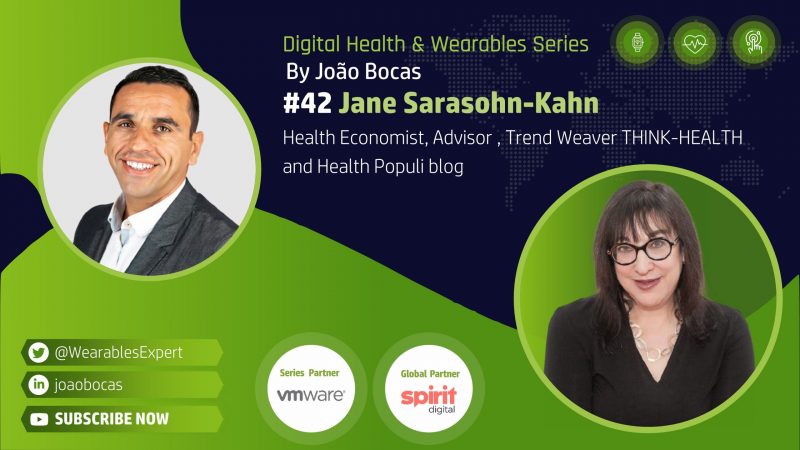
The most effective, engaging, and enchanting digital health innovations speak to patients beyond their role as health consumers and caregivers: digital health is at its best when it addresses peoples’ health citizenship. I had the great experience brainstorming the convergence of digital health, wearable tech, user-centered (UX) design, and health citizenship with João Bocas, @WearablesExpert, in a on his podcast. And if those topics weren’t enough, I wove in the role of LEGO for our well-being, “playing well,” and inspiring STEM- and science-thinking. João and I started our chat first defining health citizenship, which is a phrase I first learned from
Be Mindful About What Makes Health at HLTH
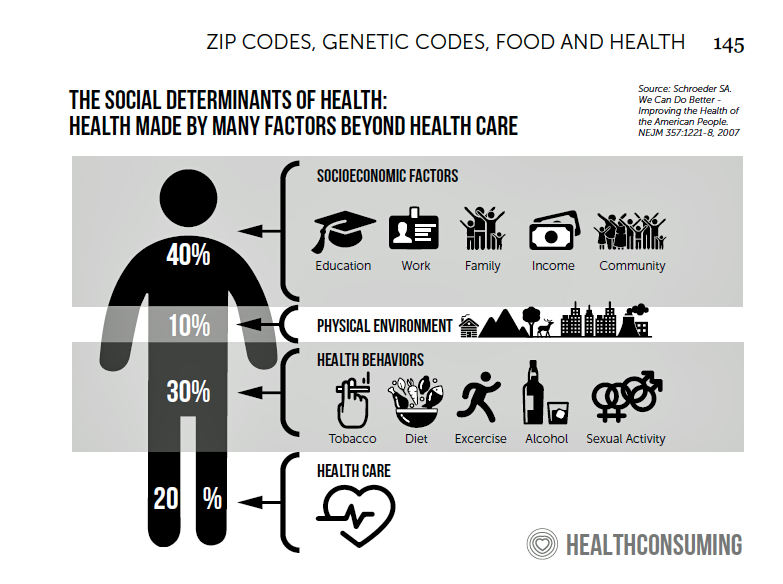
“More than a year and a half into the COVID-19 outbreak, the recent spread of the highly transmissible delta variant in the United States has extended severe financial and health problems in the lives of many households across the country — disproportionately impacting people of color and people with low income,” reports Household Experiences in America During the Delta Variant Outbreak, a new analysis from the Robert Wood Johnson Foundation, NPR, and the Harvard Chan School of Public Health. As the HLTH conference convenes over 6,000 digital health innovators live, in person, in Boston in the wake of the delta
Health Privacy and Our Ambivalent Tech-Embrace – Lessons for Digital Health Innovators
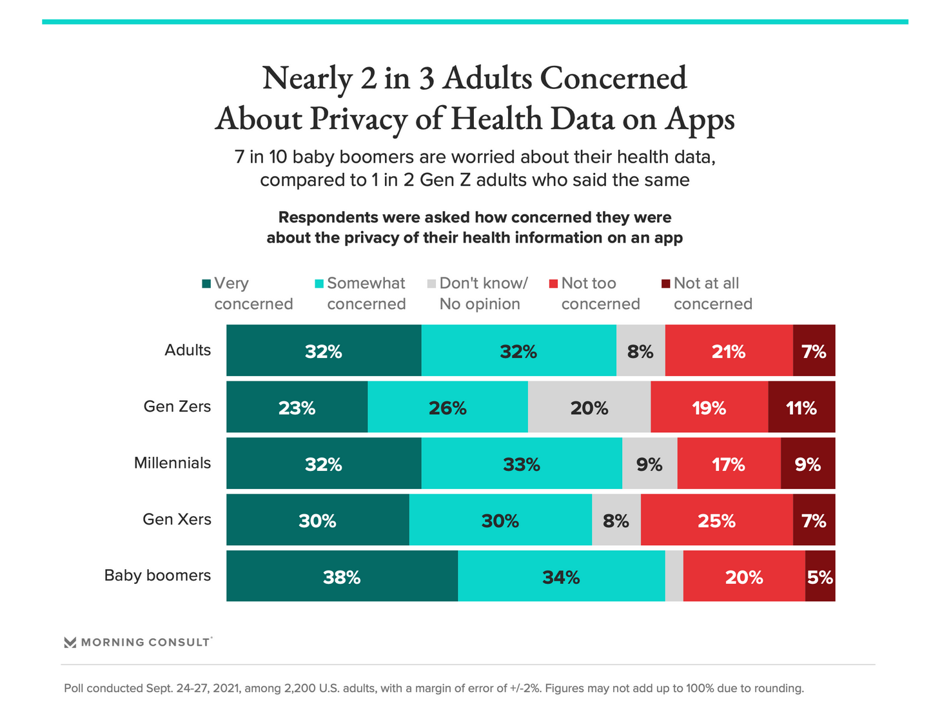
A new look into Americans’ views on health privacy from Morning Consult provides a current snapshot on citizens’ concerned embrace of technology — worried pragmatism, let’s call it. This ambivalence will flavor how health citizens will adopt and adapt to the growing digitization of health care, and challenge the healthcare ecosystem’s assumption that patients and caregivers will universally, uniformly engage with medical tools and apps and technologies. More Boomers are concerned with health data app privacy than Gen Z consumers, as the chart illustrates. 46% of U.S. adults said that health monitoring apps were not an invasion of privacy; 32%
A Nutrition Label for Health IT
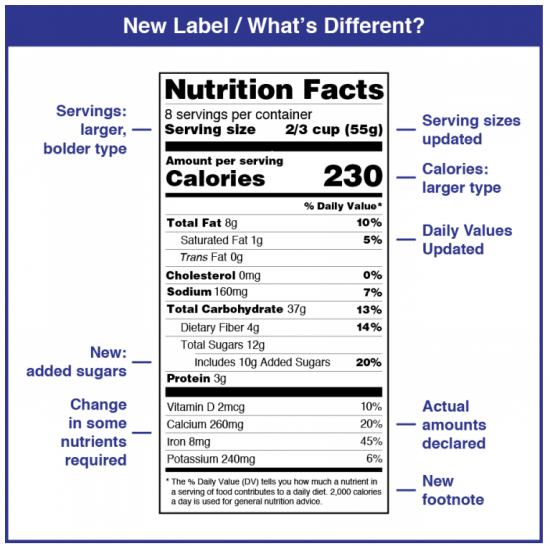
“Shouldn’t we, as a society, demand a nutrition label on our algorithms?” asked Dr. John Halamka. Dr. Halamka, President of the Mayo Clinic Platform, was speaking at the HIMSS 2021 annual conference on the meeting’s digital channel. Artificial intelligence and health equity were two key themes discussed during #HIMSS21, and Dr. Halamka’s concerns echoed through the week-long event. To illustrate the need for a healthier approach to AI, he offered this scenario: “If I use a data set of one million Scandinavian Lutherans to create the most amazing EKG algorithm ever and then we decide to use it in Spain,
IoT and The Rise of the Machines in Healthcare
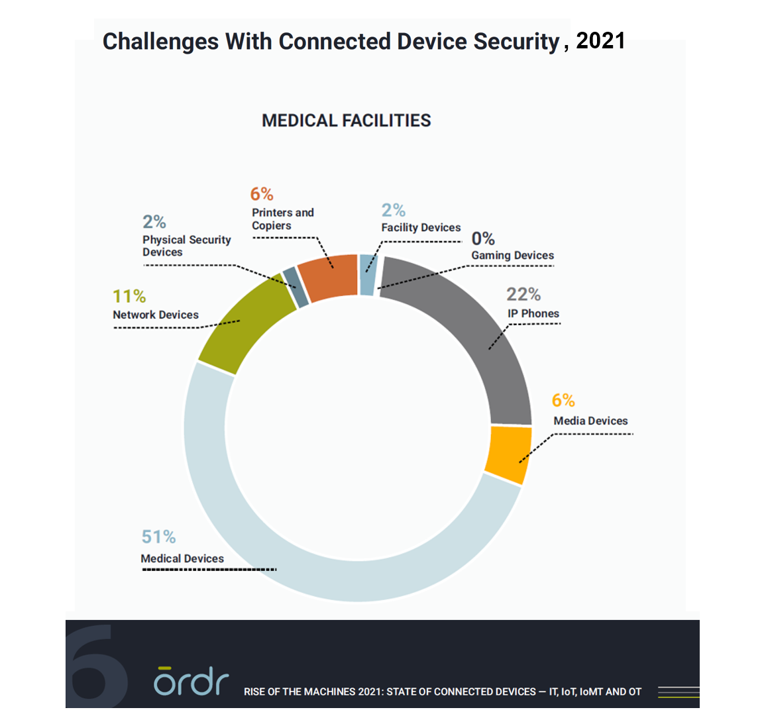
As connected devices proliferate within health care enterprises and across the health care ecosystem, cybersecurity risks abound. During the first year of the COVID-19 pandemic, the health care sector was profoundly affected by cyber-attacks on connected devices, we learn in the report, Rise of the Machines 2021: State of Connected Devices – IT, IoT, IoMT and OT from Ordr. For this annual report, Ordr analyzed security risks across over 500 deployments in healthcare, life sciences, retail, and manufacturing sectors for the 12 months June 2020 through June 2021. In health care, outdated operating systems present some of the greatest risks:
Healthcare Via the Cloud, Across the Enterprise and in the Patient’s Home – a Sustainable View from Philips at HIMSS 2021

The COVID-19 pandemic sparked a reappraisal of value-based care, a shift to remote and virtual care, and acceleration of healthcare stakeholders’ investments in Artificial Intelligence-based solutions, Philips discovered in the 2021 Future Health Index, the company’s latest survey conducted among 2,800 health care leaders working in 14 countries. This week at the 2021 annual HIMSS conference, Philips is “making the case for moving to the cloud,” discussing the Philips HealthSuite, a cloud-based platform for connecting providers and patients, devices (and the data they generate), and care across the health care continuum. That’s a big promise and vision, so to kick
Empathy Is As Important as the Medical Treatment – the 2021 Accenture Health Experience As Backdrop to HIMSS 2021
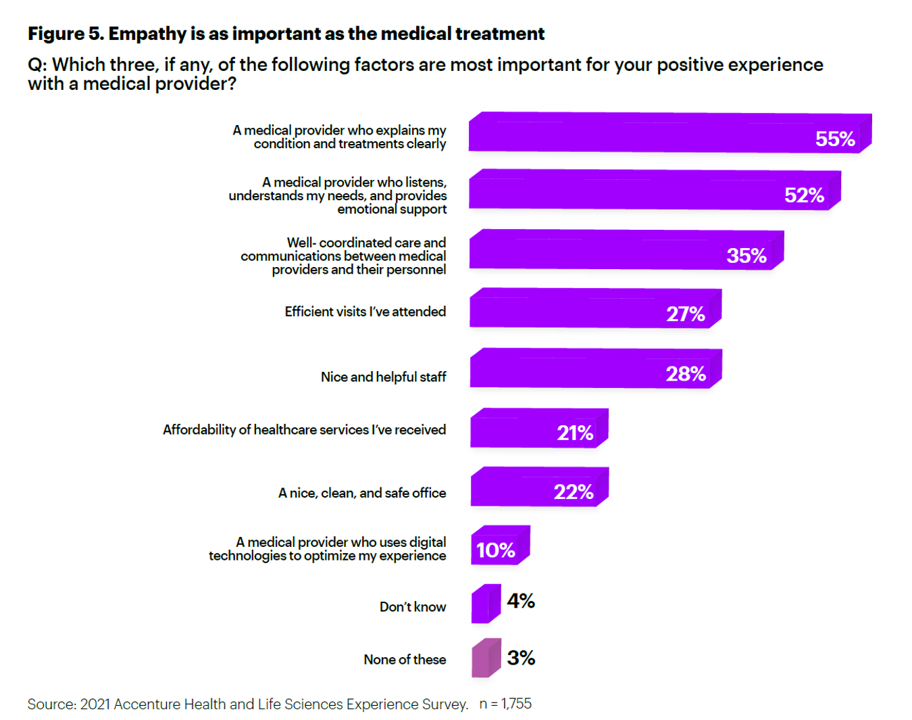
The rise of digital health investment and growing role of technology in health care services only accelerated during the COVID-19 pandemic. At the same time, people took on their own versions of digital transformation at home, for work, for school, for cooking, shopping, and indeed, for health care. But with digital health adoption gains has come some ambivalence and mixed signals, Accenture has discovered in its 2021 Health and life Sciences Experiences Survey released this week during the HIMSS Annual Conference. As the report concludes, “people’s sentiments and behaviors” with respect to technology in health care “provide no clear answer.”
Americans Grew Digital Health-Data Muscles in the Pandemic – New Insights from the Pew Charitable Trusts
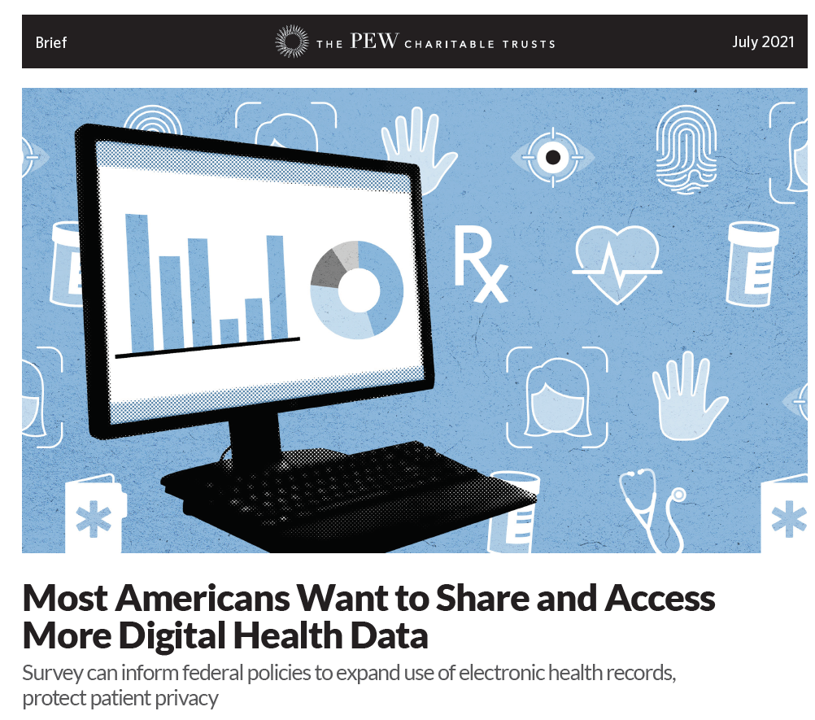
“Most Americans clearly recognize the potential benefits that improved health IT can offer, and they want this transformation of the health care system to continue,” the Pew Charitable Trusts research concludes in Most Americans Want to Share and Access More Digital Health Data. The Pew team surveyed 1,213 adults ages 18 and over in June and July 2020, interviewing in English and Spanish. As digital health industry stakeholders will be convening at the 2021 annual HIMSS conference in Las Vegas and digitally, this report is well-timed to give us a level-set on just “where” U.S. health citizens are with respect to
Regulation, Reimbursement, and Interoperability Block Health Systems’ Digital Transformation – The State of Healthcare in 2021 From HIMSS
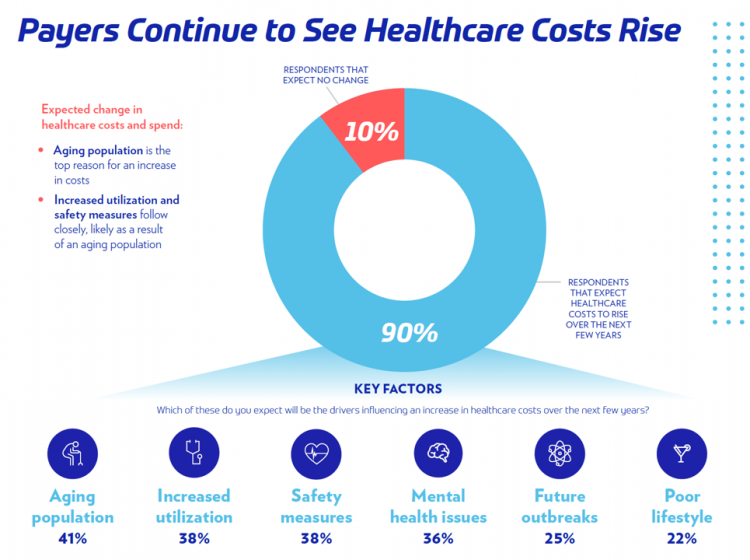
There is no doubt that the COVID-19 pandemic motivated health care providers, payers, and patients to adopt digital tools and contact-less services, allowing people to deliver and receive medical care. Still, 18 months into the pandemic, now endemic and in its fourth wave of cases spiking around the world and in many parts of the U.S., some aspects of “digital transformation” seem not to have fully transformed American healthcare, we learn in HIMSS’s annual 2021 State of Healthcare Report. HIMSS collaborated with the organizations Trust Accenture, The Chartix Group, and ZS on this year’s research. Nine in ten clinicians have recommended
The Pandemic Accelerated Consumers’ Digital Health Tech Ownership As Big Tech Morphs To Big Health
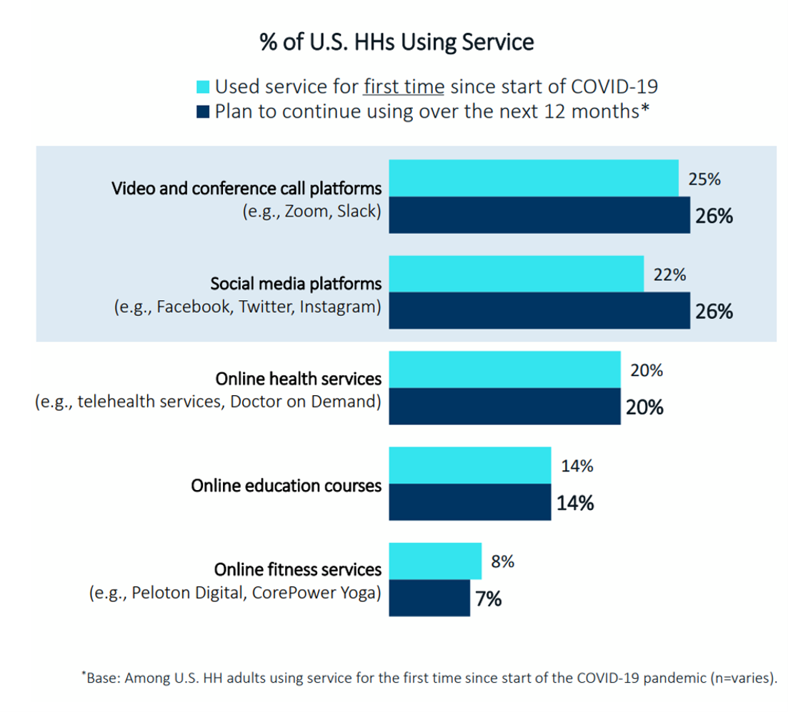
The pandemic ushered in millions of peoples’ first digital health experiences, many of which will persist according to the 23rd Annual U.S. Consumer Technology Ownership & Market Potential Study, published by the Consumer Technology Association. CTA conducted an online survey among 2,409 U.S. adult 18 and over in April 2021 to gather data for this annual report. To ensure a fair sample, CTA drew three datasets for the general population along with an Hispanic oversample and an oversample for people 65 years of age and older. The study looked at 83 consumer technology products and sub-categories, including many directly related
Virtual Health Tech Enables the Continuum of Health from Hospital to Home
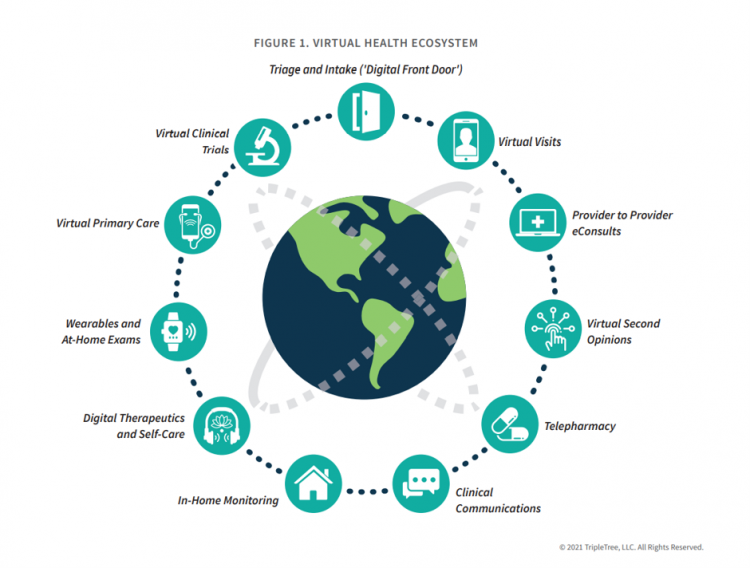
In the COVID-19 pandemic, as peoples’ daily lives shifted closer and closer to home, and for some weeks and months home-all-the-time, health care, too, moved beyond brick-and-mortar hospitals and doctors’ offices. The public health crisis accelerated “what’s next” for health care delivery, detailed in A New Era of Virtual Health, a report published by TripleTree. TripleTree is an investment bank that has advised health care transactions since 1997. As such, the team has been involved in digital health financing and innovation for 24 years, well before the kind of platforms, APIs, and cloud computing now enabling telehealth and care, everywhere. The
Trust-Busted: The Decline of Trust in Technology and What It Means for Health
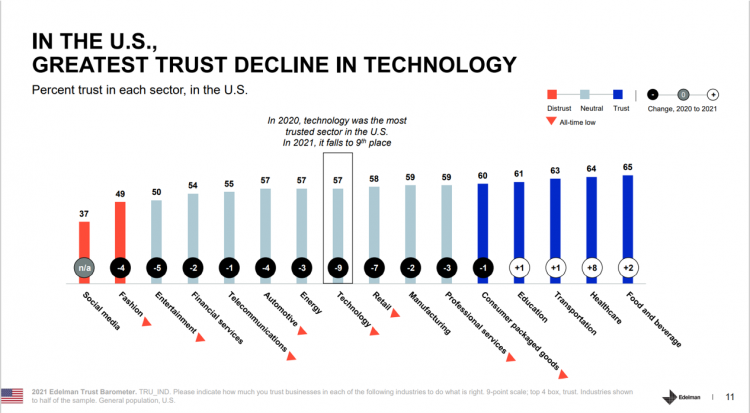
Trust in the technology industry has crashed to an all-time low based on the 2021 Edelman Trust Barometer. As Richard Edelman, CEO, concisely asserted, “Tech loses its halo.” The first chart shows the one-year trend on trust across industries through U.S. consumers’ eyes. Most industries lost citizens’ trust between 2020 and 2021, most notably, Technology, dropping the greatest margin at 9 points Retail, falling 7 points, Entertainment. falling 5 points, and, Fashion and automotive declining by 4 points. Several sectors’ trust equity rose in the year, especially healthcare growing by 8 points and food and beverage rose slightly by 2
Managing the Risks of Fast-Growing Digital Health
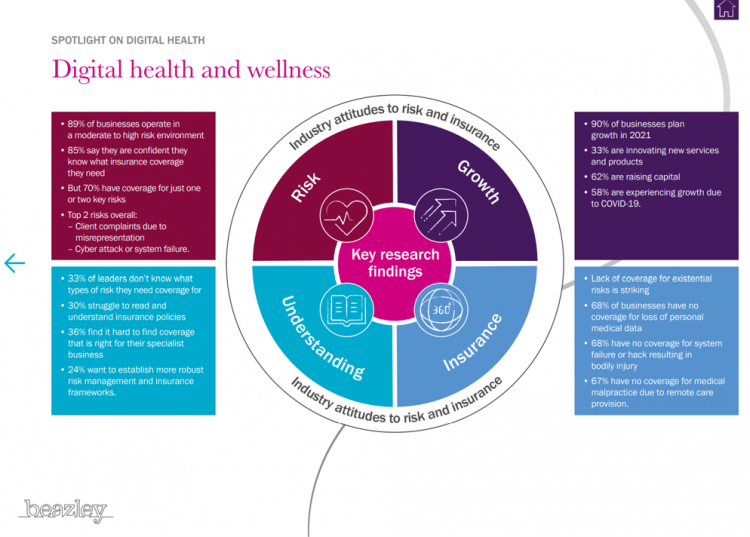
Investments in the digital health sector have fast-grown in the past decade, reaching $14bn in 2020 based on Rock Health’s latest read on the market. The COVID-19 pandemic accelerated the field across many industry segments. With such turbocharged growth on the supply side, Beazley, experts in specialty insurance, explores the risks of digital health and wellness in a new report, Digital health, telehealth and wellness: Attitudes to risk and insurance. With great potential for both innovation and reward comes great risks: Beazley points to the facts that, over two-thirds of digital health companies lack insurance coverage for medical malpractice for
The Cost of Healthcare Can Drive Medical Rationing and Crowd Out Other Household Spending
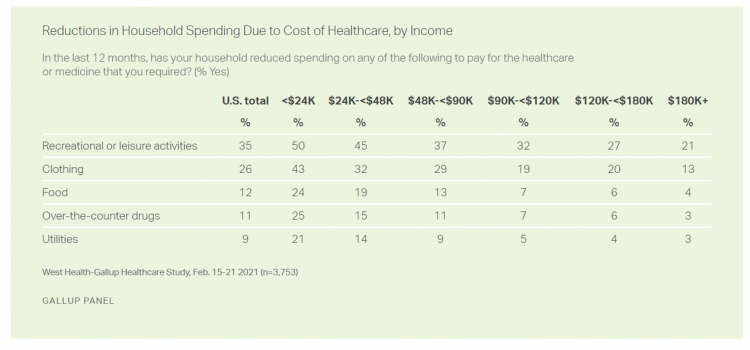
One in five people in the U.S. cannot afford to pay for quality health care — an especially acute challenge for Black and Hispanic Americans, according to a West Health-Gallup poll conducted in March 2021, a year into the COVID-19 pandemic. “The cost of healthcare and its potential ramifications continues to serve as a burdensome part of day-to-day life for millions of Americans,” the study summary observed. Furthermore, “These realities can spill over into other health issues, such as delays in diagnoses of new cancer and associated treatments that are due to forgoing needed care,” the researchers expected. The first table
How Fruits and Veg Can Make Health and Lower Costs – Calling Chef José Andrés to the White House
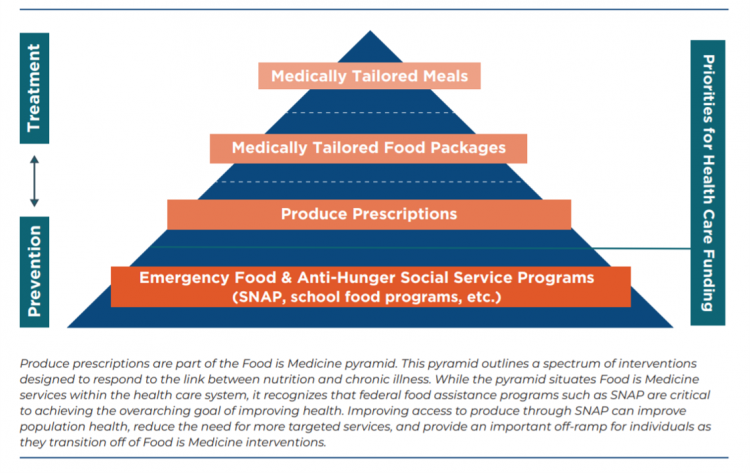
Springtime is finally emerging on the east coast of the U.S. and my local CSA farm is on my mind. It’s timely, then, to re-visit a research paper on subsidizing fruits and vegetables from a March 2019 issue of PLOS as an introduction to a new initiative growing out of The Center for Health Law and Policy Innovation of Harvard Law School (CHLPI) on produce prescriptions. Timely, too, that Chef José Andrés has been called to President Biden’s White House to help address food security in America. First, let’s look at the research in PLOS: Cost-effectiveness of financial incentives for
The Digital Transformation of Patients – Update from Rock Health and Stanford
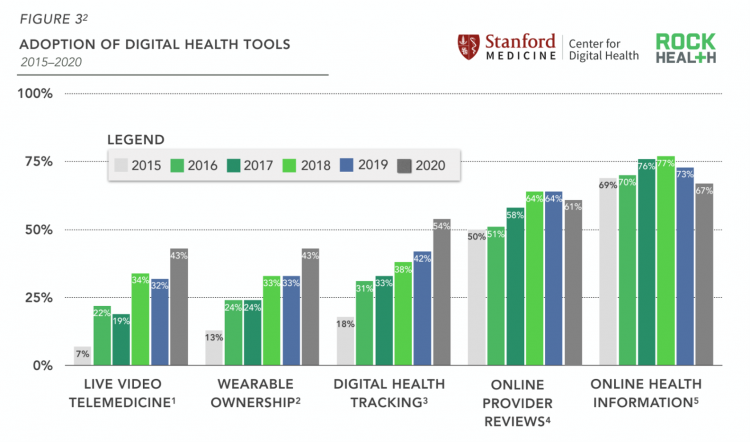
The coronavirus pandemic accelerated digital transformation of organizations, including health care providers. But another patient side-effect of COVID-19 has been the digital transformation of many patients, documented by data gathered by Rock Health and Stanford Center for Digital Health and analyzed in their latest report explaining how the public health crisis accelerated digital health “beyond its years,” noted in the title of the report. Rock Health and Stanford commissioned an online survey among 7,980 U.S. adults from early September to early October 2020 to gauge peoples’ interest in and utilization of digital health tools and telehealth. Rock Health has conducted a consumer digital
A New Health Literacy Pillar: Personal Data Stewardship
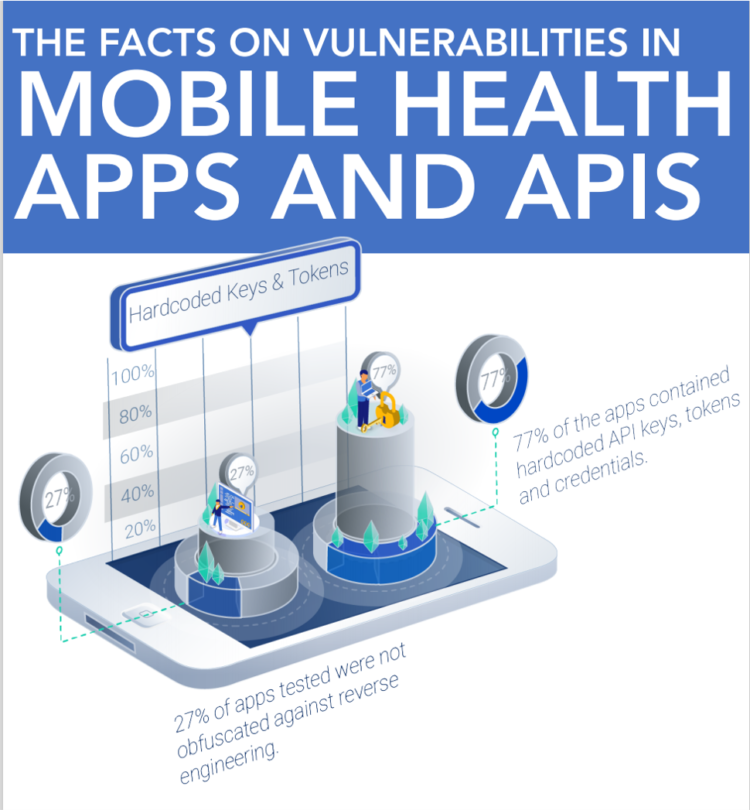
The growing use of APIs in health information technology innovation for patient care has been a boon to speeding development placed in the hands of providers and patients. Using APIs can help drive interoperability and make data “liquid” and useable. APIs can enable “Data liberación,” a concept proposed by Todd Park when he worked in the Obama administration. Without securing patients’ personal health data leveraging APIs, those intimate details are highly hackable explained in All That we Let In, a report from Knight Ink and Appr0ov. It is likely that behind growing health data hacks is the marginally greater financial
Ten In Ten: Manatt’s Healthcare Priorities to 2031
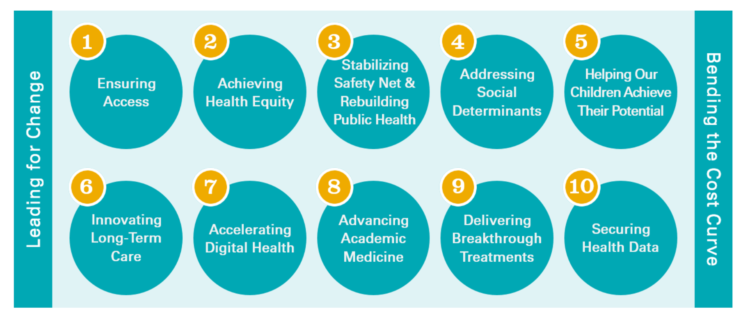
The coronavirus pandemic has exposed major weaknesses in the U.S. health care system, especially laying bare inequities and inertia in American health care, explained in The Progress We Need: Ten Health Care Imperatives for the Decade Ahead from Manatt Health. The report details the ten objectives that are central to Manatt’s health care practice, a sort of team manifesto call-to-action and North Star for the next decade. Their ten must-do’s for bending the cost curve while driving constructive change for a better health care system are to: Ensure access Achieve health equity Stability the safety net and rebuild public health
Can Telemedicine Increase Health Equity? A Conversation with Antoinette Thomas, Dave Ryan, and Me with the ATA
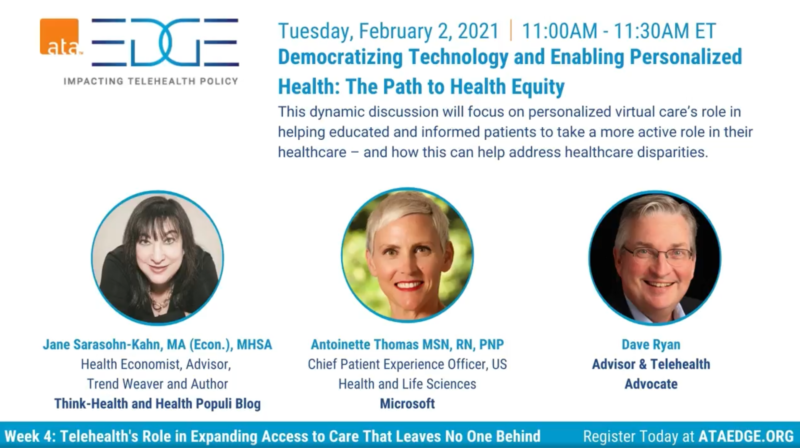
“Yes,” we concurred on our session convened by the American Telemedicine Association (ATA) EDGE session today. “We” was a trio including Antoinette Thomas (@NurseTechExec1), Chief Patient Experience Officer with Microsoft, David Ryan (@DavidPRyan), former long-time Global Head of Intel’s Health/Life Science business; and, me. Antoinette posed three questions for all of us to brainstorm, addressing various aspects of health equity. We covered, The theory that telemedicine should increase health equity — where are we and what are the barriers to getting there? The role of social determinants of health in creating equitable opportunities for health citizens; and, Entering a post-pandemic world,
Ensuring That Humanity Retains Control of Connected Things: A Message from Microsoft at CES 2021

Artificial intelligence (AI) has begun to play a role in health care for predictive analytics, personalization, and public health. On 26th January, I’ll moderate a tweetchat at 1 pm Eastern time, brainstorming the current and future state of and opportunities for AI in health care. I’ll be co-chatting with Microsoft’s AI leader, Tom Lawry (@TCLawry on Twitter). In advance of that discussion, I wanted to feature remarks shared by Brad Smith, Microsoft President, that I recently heard at CES 2021, the annual (this year, virtual) meeting convening the largest community of consumer electronics stakeholders globally Smith wove a crucial, impactful
Our Homes Are Health Delivery Platforms – The New Home Health/Care at CES 2021
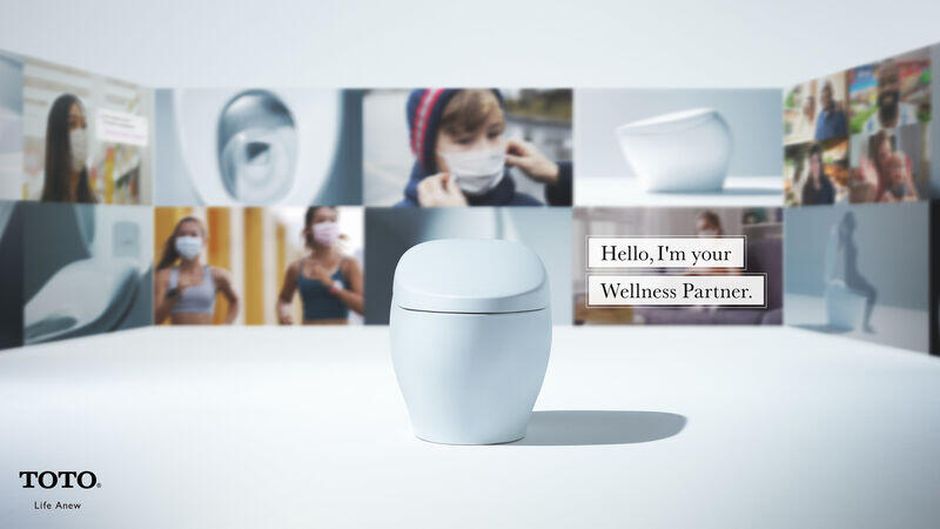
The coronavirus pandemic disrupted and re-shaped the annual CES across so many respects — the meeting of thousands making up the global consumer tech community “met” virtually, both keynote and education sessions were pre-recorded, and the lovely serendipity of learning and meeting new concepts and contacts wasn’t so straightforward. But for those of us working with and innovating solutions for health and health care, #CES2021 was baked with health goodness, in and beyond “digital health” categories. In my consumer-facing health care work, I’ve adopted the mantra that our homes are our health hubs. Reflecting on my many conversations during CES
Trust Plummets Around the World: The 2021 Edelman Trust Barometer in #CES2021 and Microsoft Context
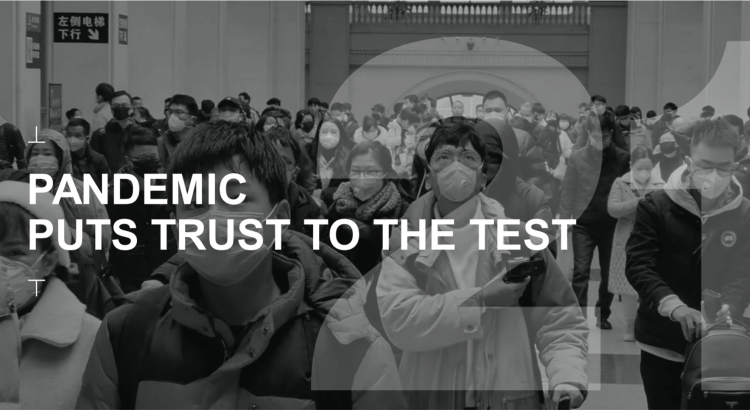
Citizens around the world unite around the concept that Trust is Dead. This is no truer than in the U.S., where trust in every type of organization and expert has plummeted in the wake of the COVID-19 pandemic, political and social strife, and an economic downturn. Welcome to the sobering 2021 Edelman Trust Barometer, released this week as the world’s technology innovators and analysts are convening at CES 2021, and the annual JP Morgan Healthcare meetup virtually convened. As the World Economic Forum succinctly put the situation, “2020 was the year of two equally destructive viruses: the pandemic and the
Do-It-Yourself Innovation Comes to Health at Home – Telehealth, Fjord 2021 Trends and #CES2021
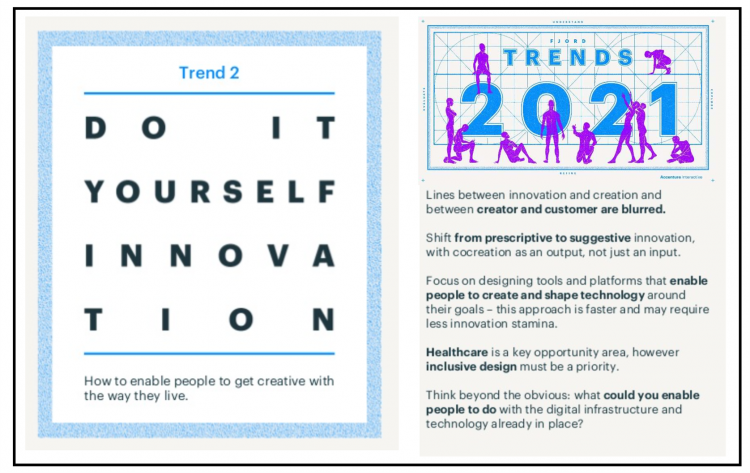
The pandemic has digitally transformed those people who could work from home, school at home, and undertake daily life-flows as health citizens tried to keep the coronavirus (and other people) at-a-distance. “Emerging hand-in-hand with place displacement, activity displacement is simply about the change in how people do things. Almost overnight, school lessons and doctors’ appointments were online. Yoga classes, concerts and weddings were streamed via Zoom,” Fjord Trends 2021 from Accenture Interactive observes. “Historically, people have often been quick to adopt new digital technology and slower to adapt to what it can help them achieve,” Fjord noted. But COVID-19 has
The Digital Consumer, Increasingly Connected to Health Devices; Parks Associates Kicking Off #CES2021
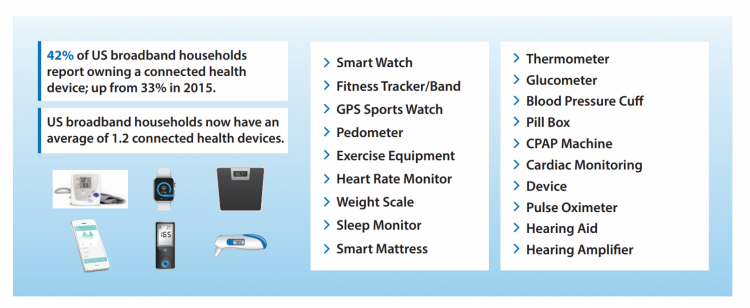
In 2020, the COVID-19 pandemic drove U.S. consumers to increase spending on electronics, notably laptops, smartphones, and desktop computers. But the coronavirus era also saw broadband households spending more on connecting health devices, with 42% of U.S. consumers owning digital health tech compared with 33% in 2015, according to research discussed in Supporting Today’s Connected Consumer from Parks Associates. developed for Sutherland, the digital transformation company. Consumer electronics purchase growth was, “likely driven by new social distancing guidelines brought on by COVID-19, which requires many individuals to work and attend school from home. Among the 26% of US broadband households
The 2021 Health Populi TrendCast – Health Care, Self-Care, and the Rebirth of Love in Public Health
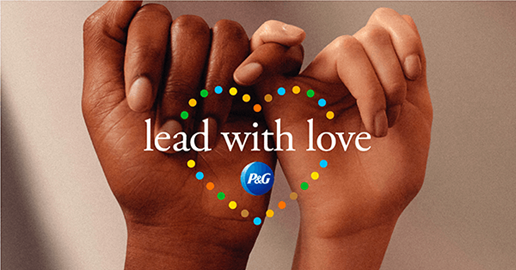
In numerology, the symbolic meaning behind the number “21” is death and re-birth. In tarot cards, 21 is a promise of fulfillment, triumph, and victory. How apropos that feels right now as we say goodbye and good riddance to 2020 and turn the page for a kinder, gentler, healthier New Year. It would be sinful to enter a New Year as challenging as 2021 promises to be without taking the many lessons of our 2020 pandemic life and pain into account. For health care in America, it is a time to re-build and re-imagine a better, more equitable landscape for
How COVID-19 Mobilized Participatory Health and the Importance of “Correct” Personal Health Records
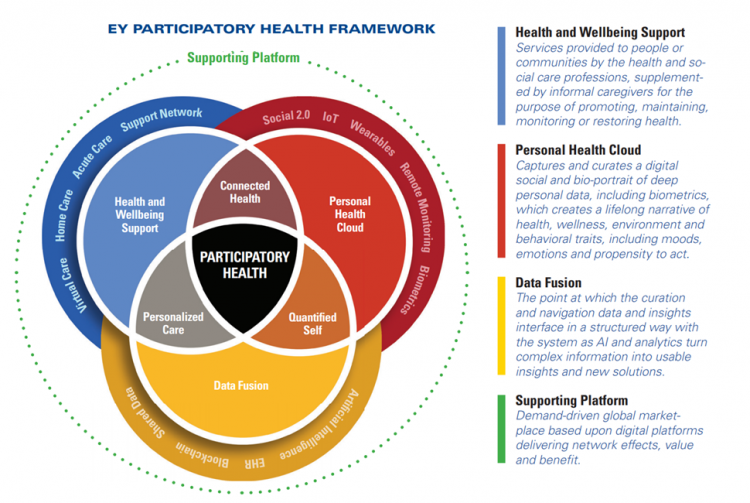
explained in a new report from EY co-sponsored by the American Hospital Association (AHA) and the AHA Center for Health Innovation. Digital Transformation – Anywhere Care envisions “health care with no address, or bringing care to the consumer or patient rather than expecting the patient to go to the hospital” as a “vital sign” of health care’s changes going into the new year of 2021. COVID-19 accelerated a movement in which I’ve been involved for over a decade, known as “participatory health.” In its early phase in the U.S., Dr. Tom Ferguson identified the emerging role of the internet in
Health Consumers Keen to Share and Download Data, But Privacy Remains a Concern
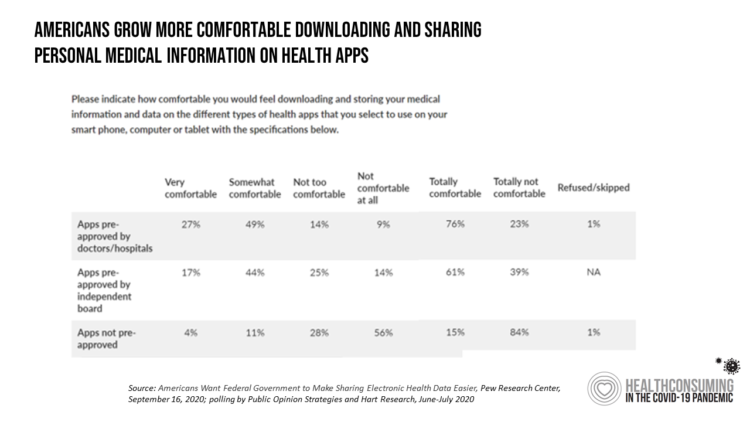
People in the U.S. are growing their health IT muscles and literacy, accelerated in the coronavirus pandemic. In particular, health consumers in America want more access to their personal health data, a study from the Pew Research Center has found in Americans Want Federal Government to Make Sharing Electronic Health Data Easier. Pew collaborated with Public Opinion Strategies and Hart Research to conduct a survey in June and July 2020 among 1,213 U.S. adults 18 and over to determine peoples’ perspectives on personal health information in light of their pandemic era experiences. This study re-confirms the current state of the health
Data Well-Being: A Pillar of Health Citizenship for US Consumers
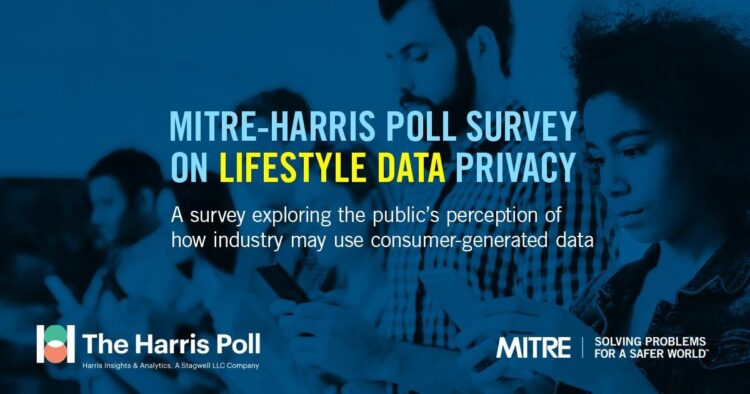
In the COVID-19 era, most U.S. consumers believe they have an obligation to share personal health information to stop the spread of the coronavirus. However, only 44% would be willing to share their personal data with a national database, a MITRE study learned. Only one-third of Americans would be willing to share their temperature, 29% their location, and one-fourth information about their chronic conditions. The Harris Poll conducted the study among 2,065 U.S. adults 18 and over in mid-June 2020 to gauge peoples’ perspectives on health data and privacy. Three-quarters of people in the U.S. believe that data privacy “is a
For Health Consumers, Trust, Privacy, & Good Experience Must Be Baked Into Digital Health Care
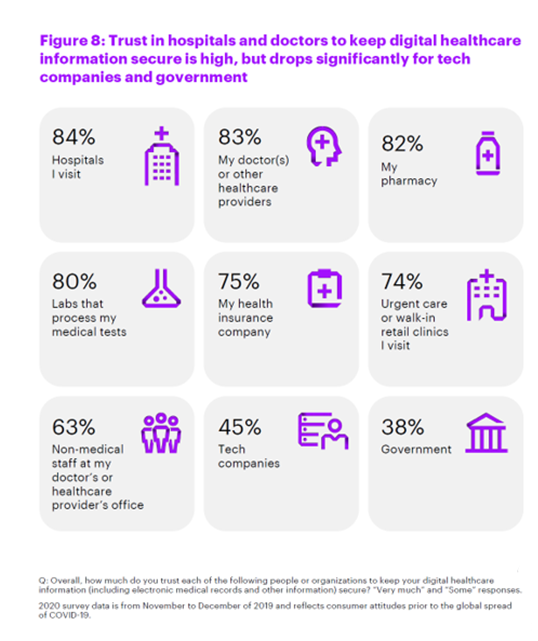
“Digital transformation” was the mantra for all industries before we heard about the COVID-19 virus. Since the emergence of the pandemic, the coronavirus has accelerated the adoption of digital platforms, AI, and ecommerce. That is at least as true for the health care sector as it has been for other industry segments. So, will the fast-adoption of virtual care and other forms of digitization in health care last? Accenture probes this question in a report published today asking, How Can Leaders Make Recent Digital Health Gains Last? In Accenture’s words, “COVID-19 forced a surge” in virtual health care following a
The Latest Health Technology Vision and Consumer Behavior Insights From Accenture
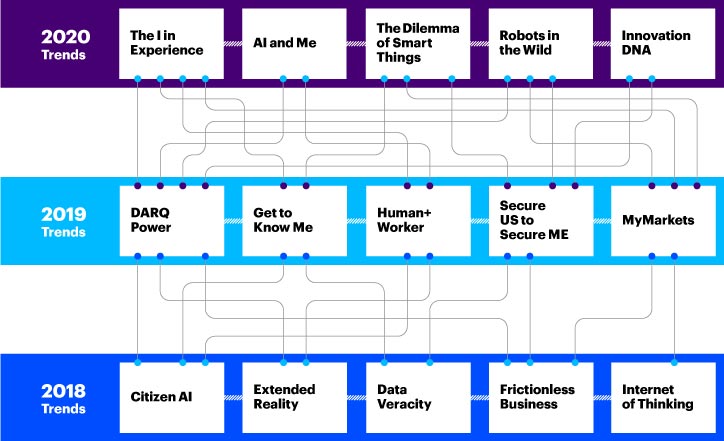
The COVID-19 pandemic hastened digital transformation for both the health care industry and for individuals — as health consumers, patients, caregivers, and health citizens. Two new reports from Accenture update our understanding of the changed health consumer in the context of both “home: and the health care ecosystem. These reports are Accenture’s annual Digital Health Technology Vision 2020, and an analysis of the firm’s Wave 7 of consumer research, answering the question, How will COVID-19 change the consumer? The 2020 tech vision for health is summarized here, tying to Accenture’s previous two years of forecasts. This year, the five pillars
Consumers’ Embrace of Digital Health Tech Stalls, and Privacy Concerns Prevail – Accenture’s 2020 Research
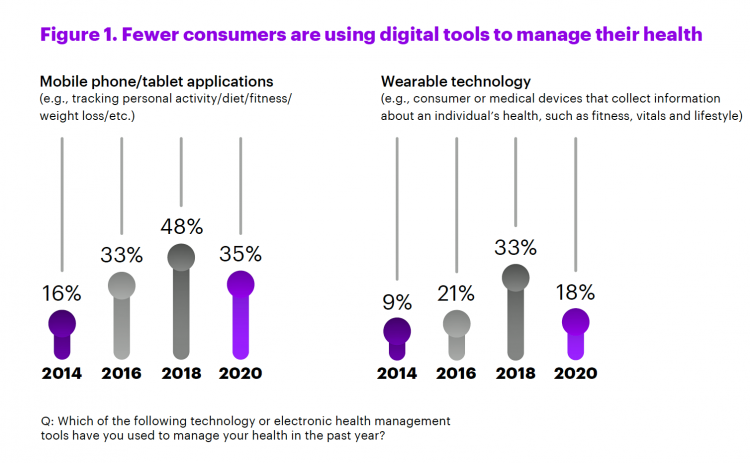
Millions of dollars and developers’ time have been invested in conceiving and making digital health tools. Yet with that bullish supply side of digital health, there was a marked decline in peoples’ use of them in the past two years, found by Accenture in their latest health consumer survey, Digital is Transforming Health, So Why is Consumer Adoption Stalling? Use of mobile apps to track personal health activity fell from nearly 1 in 2 consumers to 1 in 3. Use of wearable tech nearly halved, from 33% to 18%, between 2018 and 2020. Some, but not necessarily a majority, of
Will Trade Data for (Cheaper) Health Care – USC’s View of the Future
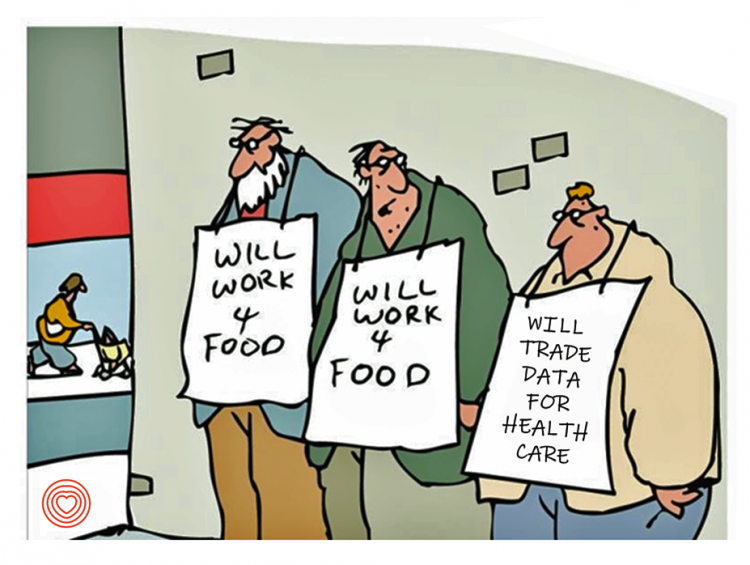
Patients are now front-line payors in the U.S. health care system. As such, American health consumers are wrestling with sticker shock from surgical procedures, surprise medical bills weeks after leaving the hospital, and the cost of prescription drugs — whether six-figure oncology therapies or essential medicines like insulin and EpiPens. To manage personal health finances, patients-as-payors are increasingly willing to face trade-offs and change personal behaviors to lower health care costs, based on research in The Future of Health Care Study from USC’s Center for the Digital Future. The Center analyzed the perspectives of 1,000 U.S. adults in August 2019 regarding
Come Together – A Health Policy Prescription from the Bipartisan Policy Center
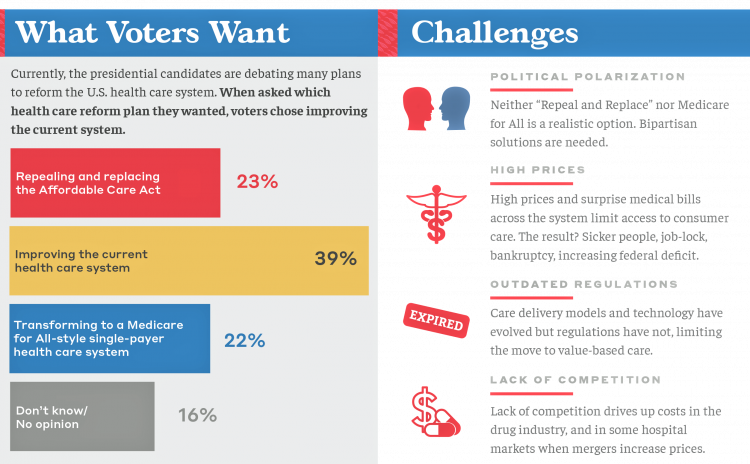
Among all Americans, the most popular approach for improving the health care in the U.S. isn’t repealing or replacing the Affordable Care Act or moving to a Medicare-for-All government-provided plan. It would be to improve the current health care system, according to the Bipartisan Policy Center’s research reported in a Bipartisan Rx for America’s Health Care. The BPC is a truly bipartisan organization, co-founded by Former Democratic Senate Majority Leaders Tom Daschle and George Mitchell, and Former Republican Senate Majority Leaders Howard Baker and Bob Dole. While this political week in America has revealed deep chasms between the Dems and
Most Americans Are Curious and Hopeful About Genetics Research, But Privacy-Concerned
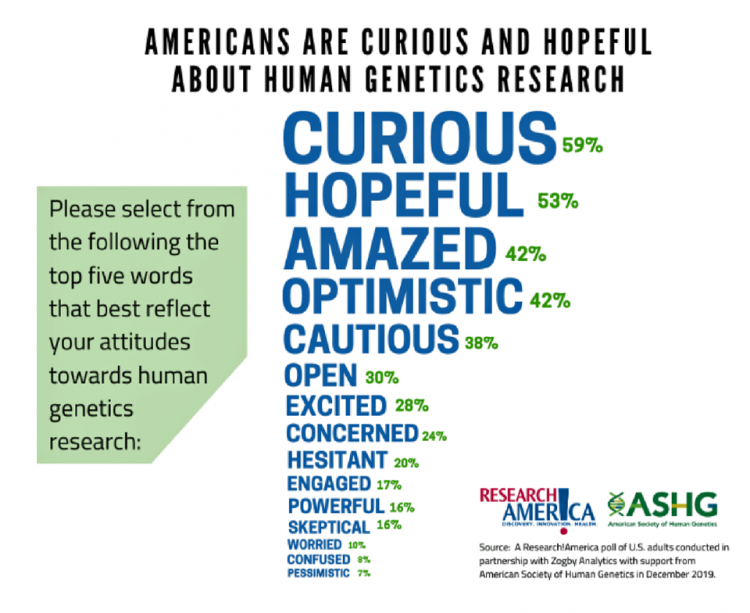
Most Americans associate more optimistic words with human genetics research than they do darker implications: “curious,” “hopeful,” “amazed.” and indeed “optimistic” ranked the top four impressions in peoples’ minds, based on a survey form the American Society of Human Genetics (ASHG). Below these perceptions are a few concerning concepts such as “cautious,” “concerned,” “hesitant, and “skeptical,” the poll found. Based on the relatively positive views on genetics research, most Americans support increasing Federal funding for that research: 74% said it was somewhat or very important to do so, compared with 15% saying it was not important. People value genetics research
The Pace of Tech-Adoption Grows Among Older Americans, AARP Finds – But Privacy Concerns May Limit Adoption
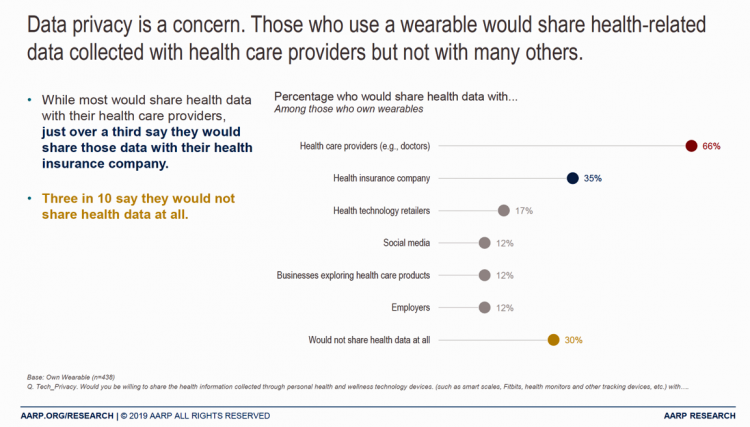
One in two people over 50 bought a piece of digital technology in the past year. Three in four people over fifty in America now have a smartphone. One-half of 50+ Americans use a tablet, and 17% own wearable tech. The same percentage of people over 50 own a voice assistant, a market penetration rate which more than doubled between 2017 and 2019, AARP noted in the 2020 Tech and the 50+ Survey published in December 2019. For this research, AARP worked with Ipsos to survey (online) 2,607 people ages 50 and over in June and July 2019. Across all
The Heart of Health at CES 2020 – a Postscript from Pew
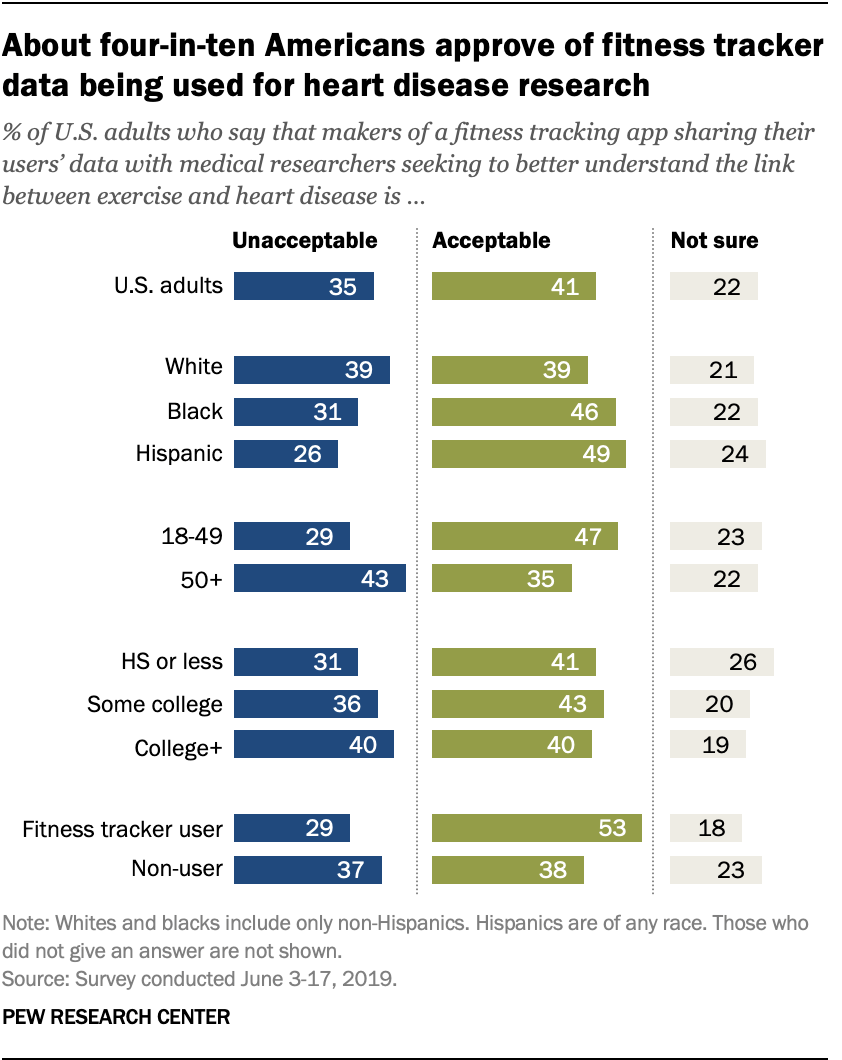
I wrote my heart-health update from #CES2020 this morning, curating a little portfolio of digital health tech announced this week in Las Vegas that could put our heart-health in our hands, mirrors, clothing, and bathroom mats. Imagine my delight to find consumer research published this week by the Pew Research Center on wearable tech adoption and perceptions. And the perfect data point to complement my CES heart-health discussion here — that 4 in 10 U.S. adults would allow a fitness tracker supplier to share the user’s personal health data with researchers to study heart disease. It’s also encouraging that 1
Trust Is the Currency for Consumer Health Engagement – A Bottom-Line at CES 2020
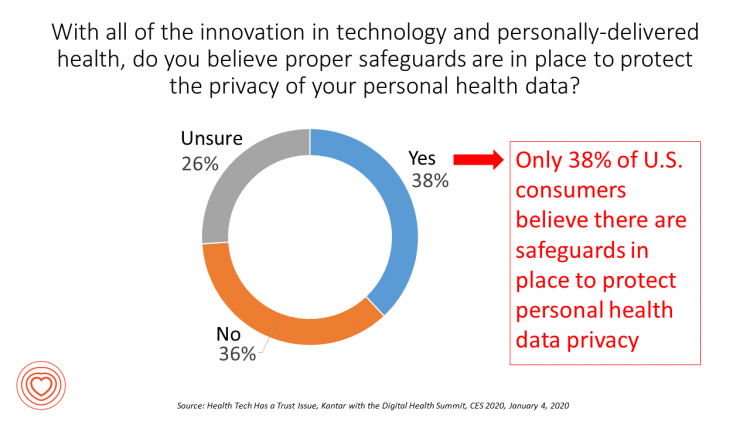
There’s less talk about Bitcoin and cryptocurrency at #CES2020. The most important currency under discussion is Trust. We have begun a consumer electronics migration from the past decade of the Internet of Things to this next decade of the Intelligence of Things. The different “I’s” signal the transition from devices that have connected to the Internet and generated data from our everyday lives, to the next ten years of gathering that data, mashing it up for meaning, and feeding back intelligence to users in the form of advising, coaching, nudging — with potentially powerful feedback loops for health, wellness and
Living in Digital Healthcare Times – Kicking off #DigitalHealthCES & #CES2020
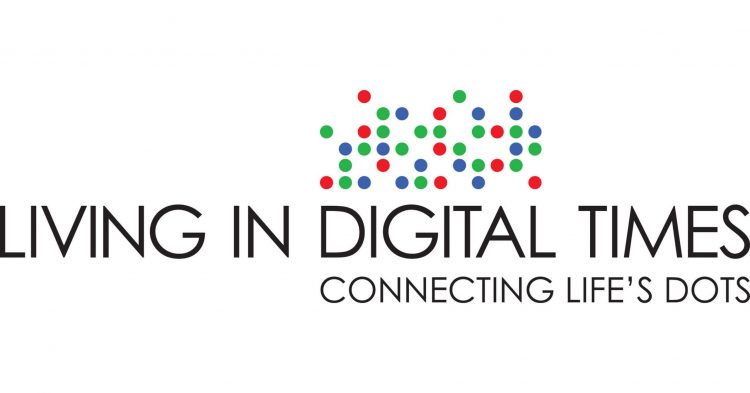
Today is Day 1 of two Media Days at #CES2020 in Las Vegas, kicking off this manic week of the Consumer Electronics Show at the Mandalay Bay convention center. For several years, I’ve convened with journalists and industry analysts from around the world for these two days before the “official” opening of CES to hear the latest news from some of the largest tech-focused companies on Earth. Announcements come from across industry sector — from automotive and transportation, telecoms, consumer goods, entertainment, social media, travel, and retail…with platform technologies playing a role including but not limited to AI, AR/VR/XR (the
Despite Greater Digital Health Engagement, Americans Have Worse Health and Financial Outcomes Than Other Nations’ Health Citizens
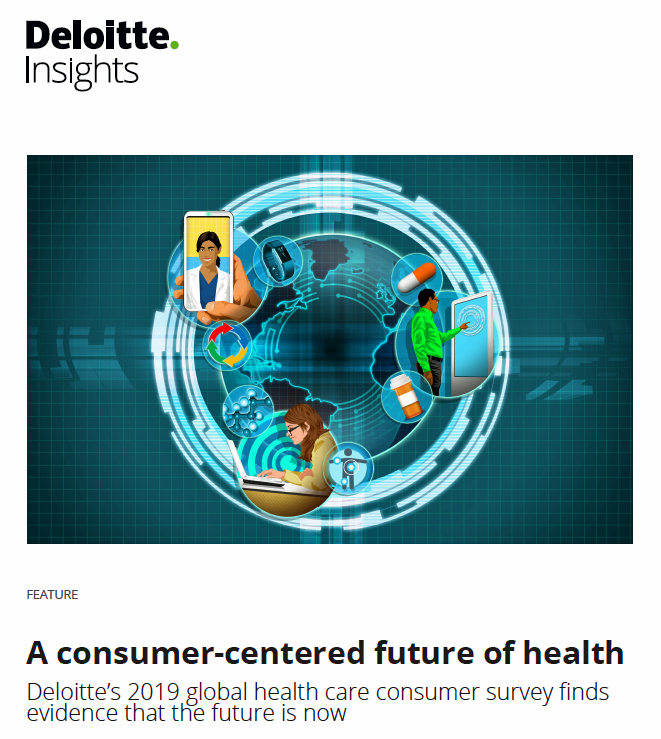
The idea of health care consumerism isn’t just an American discussion, Deloitte points out in its 2019 global survey of healthcare consumers report, A consumer-centered future of health. The driving forces shaping health and health care around the world are re-shaping health care financing and delivery around the world, and especially considering the growing role of patients in self-care — in terms of financing, clinical decision making and care-flows. With that said, Americans tend to be more healthcare-engaged than peer patients in Australia, Canada, Denmark, Germany, the Netherlands, Singapore, and the United Kingdom, Deloitte’s poll found. Some of the key behaviors
Most Health Consumers Expect Technology To Play a Larger Role As Tech-Angst & Privacy Concerns Grow

As technology continues to re-shape consumers’ experiences and expectations with health/care, retail, travel and work, peoples’ concerns about data privacy are also growing as observed by a 2020 consumer trends forecast from GlobalWebIndex, Connecting the dots. First, some overall context to the study. GlobalWebIndex “connects the dots” of consumers trends in 2020 including the topics shown in the first graphic including commerce and retail, gaming, travel, human touch, nostalgia, privacy and digital health — the first of these trends discussed in the report. Note that the data discussed in this post include responses from consumers residing in both the U.S.
Will Technology Cure Americans’ Health Care System Ills? Considering Google and Ascension Health’s Data Deal

“Google’s ‘Project Nightingale’ Gathers Personal Health Data on Millions of Americans,” the Wall Street Journal reported in today’s paper and on the WSJ.com website. The story started with the scenario that, “Search giant is amassing health records from Ascension facilities in 21 states; patients not yet informed.” Here’s Ascension’s press release on the collaboration, described in the title as “healthcare transformation.” Note: this release was written after the Wall Street Journal published this story. And, according to the WSJ reporting, “Neither patients nor doctors have been notified. At least 150 Google employees already have access to much of the data
A Tale of Two Americas as Told by the 2019 OECD Report on Health

It was the best of times, It was the worst of times, It was the age of wisdom, it was the age of foolishness, It was the epoch of belief, it was the epoch of incredulity, … starts Dickens’ Tale of Two Cities. That’s what came to my mind when reading the latest global health report from the OECD, Health at a Glance 2019, which compares the United States to other nations’ health care outcomes, risk factors, access metrics, and spending. Some trends are consistent across the wealthiest countries of the world, many sobering, such as: Life expectancy rates fell in 19 of the
Most Consumers Are Interested in Using a Voice Assistant for Some Type of Health Care
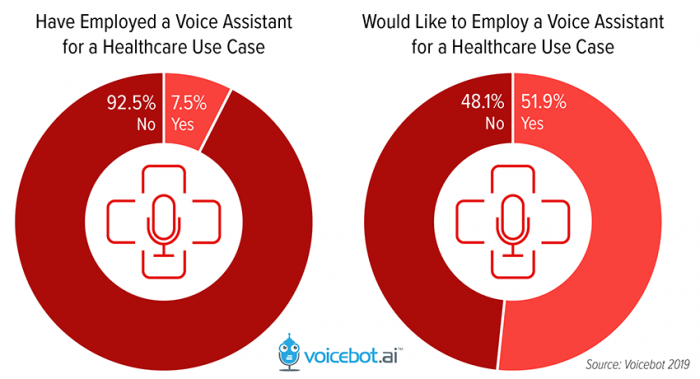
While 75 million people in the U.S. have a smart speaker at home, only 1 in 13 Americans have used a voice assistant like Alexa or Google Assistant for health care. But over one-half of consumers would like to access a voice assistant for some aspect of their health care, according to a study from Orbita and Voicebot, Voice Assistant Consumer Adoption in Healthcare. The study polled 1,004 U.S. adults 18 and over in September 2019. In 2019, few health care providers have adopted voice assistants into their workflows. The report calls out one big barrier to early adoption especially
Prelude to Health 2.0 2019: Thinking Consumers At the Center of Digital Health Transformation

“Digital transformation” is the corporate strategy flavor of the moment across industries, and the health are sector isn’t immune from the trend. As this 13th year of the annual Health 2.0 Conference kicks off this week, I’m focused on finding digital health innovations that engage people — consumers, caregivers, patients, health citizens all. This year’s conference will convene thought leaders across a range of themes, and as is the Health 2.0 modus operandi, live demo’s of new-new things. As Health 2.0 kicks off today in pre-conference sessions, there is useful context described in a new report from the American Hospital
Health Consumers Expect Healthcare to be Digital (and Secure), Philips Future Health Index Finds

Health care system financing, delivery, and workflows widely vary across nations around the world. Philips surveyed health care professionals and consumers living in 15 countries, from North America to Asia, and found that these health systems share one over-arching objective: to provide quality care with improved experiences for both patients and healthcare professionals. Being Philips, what underpins that quality and experience is technology; Philips explored telehealth, AI, digital health records (DHRs), and other digital health tools that can engage patients. Philips published results from this global study in The Future Health Index 2019, themed “Transforming healthcare experiences, exploring the impact
Americans Most-Trust Health Care Providers With Their Data – But Are They Right To Do So?
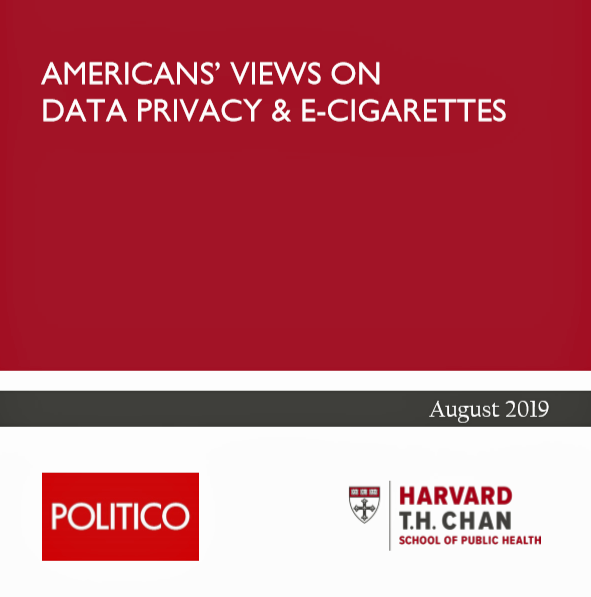
Americans least-trust social media companies, Internet search engines, and the Federal government to keep their personal information secure. Americans most-trust their doctors, their banks, and their hospitals to protect their personal information. Are people clear-headed about this perception? I pose, prompted by this month’s survey from POLITICO and the Harvard Chan School of Public Health on data privacy and e-cigarettes. The first table shows that major finding, with a view on the consumer’s political party identification. There are interesting results revealed by party ID: More Democrats trust doctors, hospitals, health plans, and credit card companies with their personal data. More
Privacy and the New Health Ciitizen
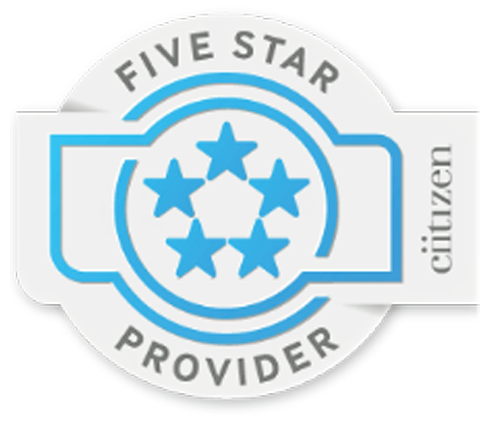
Data security breaches, access challenges, and privacy leakages plague the current state of Americans’ personal health information (PHI). HIPAA, the Health Insurance Portability and Accountability Act that was legislated in 1996, isn’t sufficiently robust to deal with the nature of this health information 23 years after that law was first implemented. That’s not a typo in the title: Ciitizen (spelled with two “i’s”) launched a The Patient Record Scorecard on 14th August. The Scorecard was developed to gauge the progress (and lack thereof) of patient information access afforded by peoples’ health care providers. What did Ciitizen learn from this process?
From Health Consumers to Health Citizens – a U.S. Patient Rights Moonshot?
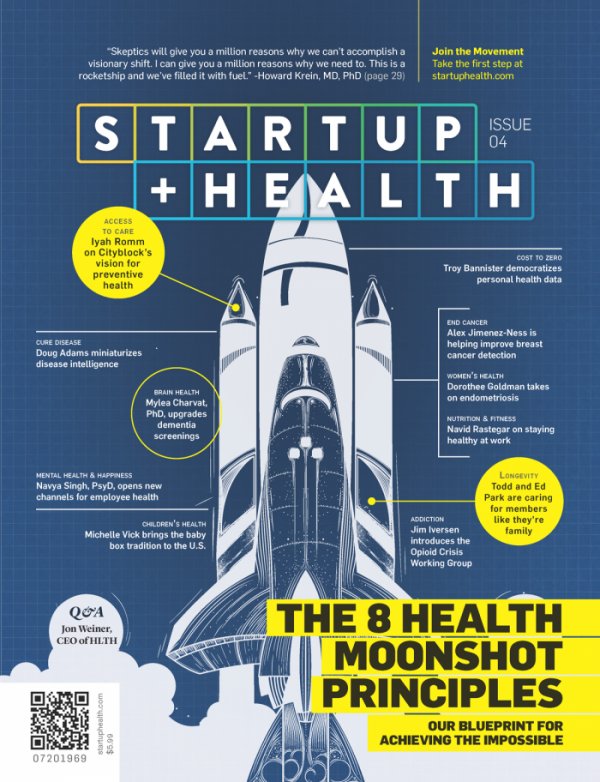
Issue No. 4 of StartUp Health Magazine is dedicated to 8 Health Moonshot Principles. StartUp Health sees these moonshots taken together as, “a blueprint for achieving the impossible.” There’s an aspect of U.S. health care that currently feels impossible to achieve, and that’s consensus on what would constitute a sound approach to covering all Americans for health care as a civil right and whether the nation can “afford” doing so. On pages 22-23 of the digital magazine, you’ll find my essay, “From Health Consumers to Health Citizens.” This write-up summarizes the plotline of my book titled HealthConsuming, which features that
Marketing Health To Consumers in the Age of Retail Disruption

Today, I am speaking with marketing leaders who are members of CHPA, the Consumer Healthcare Products Association on this very topic. This is CHPA’s 2019 Marketing Conference being held at the lovely historic Hotel du Pont in Wilmington, DE. The gist of my remarks will be to focus on the evolving retail health ecosystem, with my HealthConsuming lens on health/care, everywhere. And timing is everything, because today is International Self-Care Day to promote peoples’ health engagement. The plotline begins with a tale of two companies — CVS/health and Best Buy — discussing these two organizations’ approach to acquiring companies to expand
The Monetary, Clinical and Ethical Value of Patient Data – A View from the UK and NHS

There are about 55 million patient records held by the United Kingdom’s National Health Service (NHS). Their monetary value to private sector companies would be £5 billion and nearly that much in patient benefits. Add in value for patient outcomes, and the total approaches £10 billion. In today’s UK:US currency exchange rate, 10 billion British pound sterling is worth roughly $12 billion. Realising the Value of Healthcare Data from EY explores how patient data can, in the words of the report, “unlock significant operational savings, enhanced patient outcomes, and wider economic benefits” for the NHS and patients through using artificial
Prescription Drugs Are Becoming A Luxury Good in America – Join the #HCLDR Chat Tonight
“Drugmakers Push Their Prices Higher” is the top story under the Business & Finance banner in today’s Wall Street Journal. That’s in terms of drugs’ list prices, which most patients don’t pay. But drug costs to patients are in the eye of the beholder, who in a high-deductible plan or Medicare Part D donut hole becomes the first-dollar payer. Patients continue to face rising drug costs, pushing them into what I’ve been thinking about as luxury-goods territory. The economic definition of a luxury good is a product for which demand increases more than proportionally as income rises, so that spending
A Matter of Trust, Perception, Risk, and Uncertainty – The Big Issues Raised by the Acquisition of PatientsLikeMe and Other Patient Data Transactions

By Susannah Fox, Jane Sarasohn-Kahn and Lisa Suennen I’ve lived long enough to have learned The closer you get to the fire the more you get burned But that won’t happen to us Cause it’s always been a matter of trust A Matter of Trust, by Billy Joel If you’re in health care and don’t live under a rock, you have probably heard that United Health Group (UHG) has acquired PatientsLikeMe (PLM). After the announcement, there was a lot of sound and fury, some of which signified nothing, as the saying goes, and some which signified a lot.
Health Care and the Democratic Debates – Part 1 – Medicare For All, Rx Prices, Guns and Mental Health

Twenty Democratic Presidential candidates each have a handful of minutes to make their case for scoring the 2020 nomination, “debating” last night and tonight on major issues facing the United States. I watched every minute, iPad at the ready, taking detailed notes during the 120 minutes of political discourse conducted at breakneck speed. Lester Holt, Savannah Guthrie, and Jose Diaz-Balart asked the ten candidates questions covering guns, butter (the economy), immigration, climate change, and of course, health care — what I’m focusing on in this post, the first of two-debate-days-in-a-row. The first ten of twenty candidates in this debate were,
The Most Important Trends For Health in Mary Meeker’s 2019 Internet Report Aren’t About Health Care
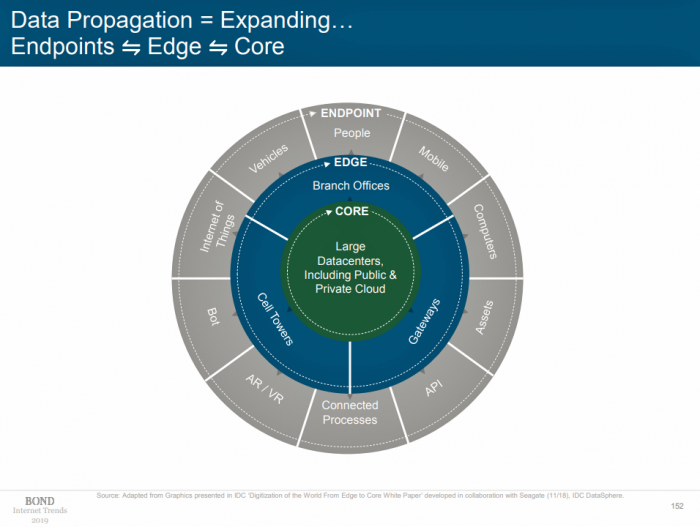
The health care section of Mary Meeker’s 334-page annual report, Internet Trends 2019, comprises 24 of those pages (270 through 293). These two dozen exhibits detail growing adoption of digital tech in health care, the growth of genomics and EHR adoption, examples of these tools from “A” (Apple) to “Z” (Zocdoc), and on the last page of that chapter, medical spending in the U.S., the highest in raw and per capita numbers versus the rest of the world. But the most important implications for American health care aren’t found in those pages: they’re in other parts of the report addressing
Will Health Consumers Morph Into Health Citizens? HealthConsuming Explains, Part 5

The last chapter (8) of HealthConsuming considers whether Americans can become “health citizens.” “Citizens” in this sense goes back to the Ancient Greeks: I return to Hippocrates, whose name is, of course, the root of The Hippocratic Oath that physicians take. Greece was the birthplace of Democracy with a capital “D.” Hippocrates’ book The Corpus is thought to be one of the first medical textbooks. The text covered social, physical, and nutritional influences, and the concept of “place” for health and well-being. Here, the discussion detailed the roles of air and water for health. The Hippocratic texts also coached doctors to
The Promise of Digital Health and the Privacy Perils – HealthConsuming Explains, Part 4

The supply side of digital health tools and tech is growing at a hockey-stick pace. There are mobile apps and remote health monitors, digital therapeutics and wearable tech from head-to-toe. Today in America, electronic health records (EHRs) are implemented in most physician offices and virtually all hospitals. Chapter 5 of my book, HealthConsuming: From Health Consumer to Health Citizen, details the promise of digital health: wearable, shareable and virtual. Today, we can also call on Alexa to remind us to take medications, play nostalgic music when we are lonely, check our physical activity status with Fitbit, and query WebMD about
What We Know We Know About ZIP Codes, Food, and Deaths of Despair – HealthConsuming Explains, Part 3

“There’s a 15-year difference in the life expectancy between the richest and poorest Americans.” That’s the first sentence of Chapter 7 in my book, HealthConsuming: From Health Consumer to Health Citizen. This data point comes from research published in JAMA in April 2016 on the association between income and life expectancy in the U.S. (That’s endnote #399 in the back of the book, one of 519 notes I use to support the plotline). Today, the Brookings Institution convened a meeting on the funding for social determinants of health to address disparities, costs, and quality of healthcare in America. The overall
Health Consumers Are Now Amazon-Primed for Healthcare – HealthConsuming Explains, Part 2
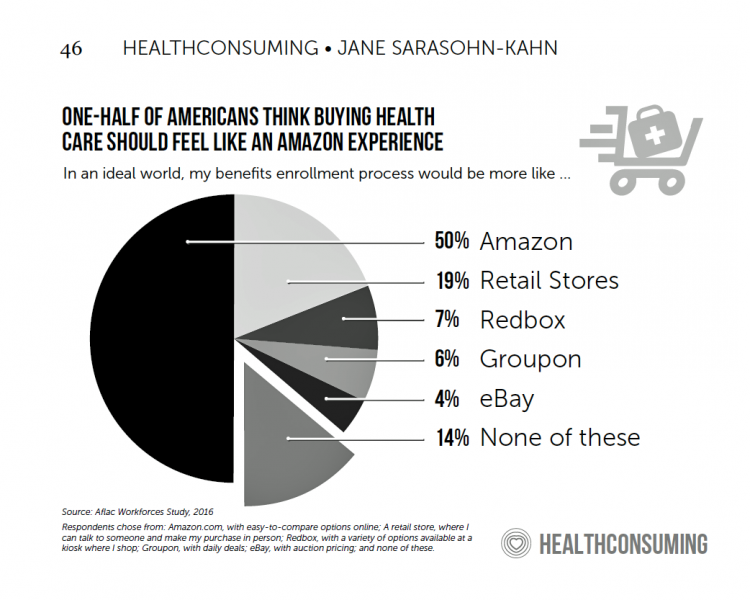
As patients now assume the role of health consumer, they rationally expect retail-level experiences with greater first-dollar payment for health insurance, health care services and medical products like prescription drugs. Consumers know what good retail looks and feels like, and are focusing that experiential lens on health care, Aflac found when their Workforces Survey polled Americans on their desirable health insurance shopping experience. One in two people said it should feel, “like Amazon,” and another 20% of folks said, “like retail.” Chapter 3 of HealthConsuming is titled, “How Amazon Has Primed Health Consumers,” and explains this re-shaping of patient expectations.
Trust In Data Stewardship Is Healthcare Providers’ To Lose
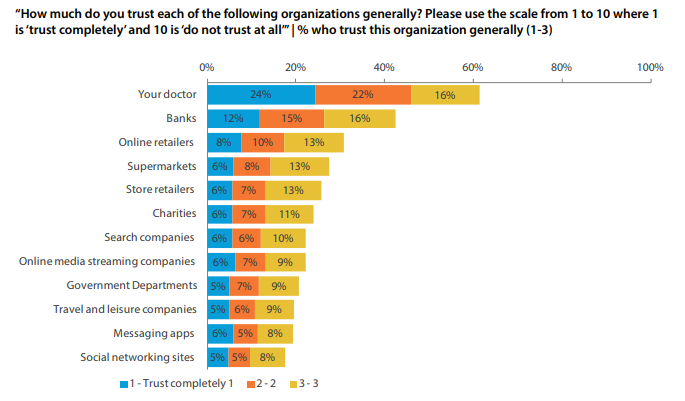
Trust is a precursor to health engagement, I learned way back in 2008 when I collaborated with Edelman on the first Health Engagement Barometer in 2008. This chart illustrated data from that survey, showing that trust, authenticity and satisfaction were the top three drivers among consumers looking to engage for health. I attended the annual 2019 HIMSS conference in February for nearly a week of meetings, interviews, education sessions, company private salons, and social media check-ins with my fellow and sister HIMSS Social Media Ambassadors. One of the SMA objectives is to consider the Conference in advance and offer thoughts
Digital Health As A Basic Human Need – the Dentsu Digital Society Index 2019
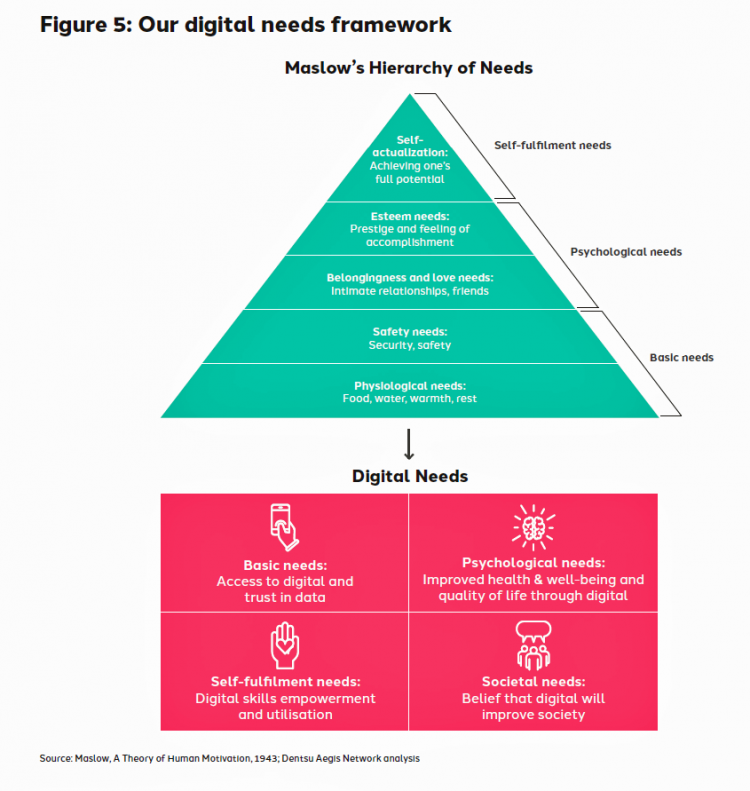
We are all Homo informaticus these days, multi-channel, multi-platform beings using digital platforms. “Computing is not about computers anymore. It is about living,” Nicholas Negroponte wrote in Being Digital. He said that in 1995. In that quarter-century since Negroponte made that prescient observation, we come to better understand that being a Digital Society has its upsides and downfalls, alike. We need a “new needs model” for the digital age, asserts a new report, Human Needs in a Digital World, the 2019 Digital Society Index report from the Dentsu Aegis network. Taking Maslow’s Hierarchy of Needs as a basic construct, the Index





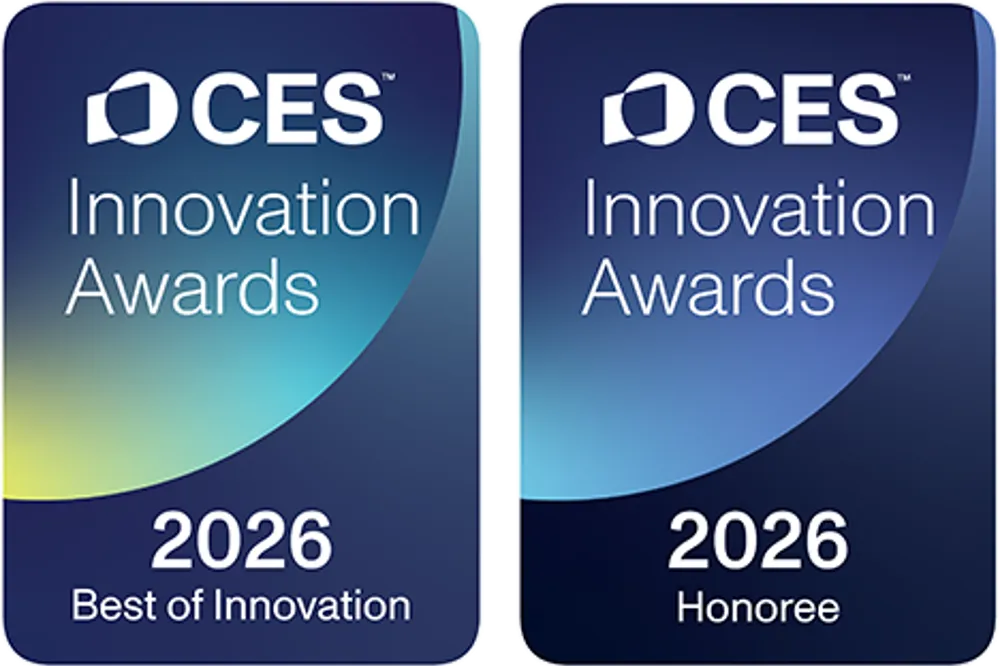 I'm once again pretty gobsmackingly happy to have been named a judge for
I'm once again pretty gobsmackingly happy to have been named a judge for  Stay tuned to Health Populi in early January as I'll be attending Media Days and meeting with innovators in digital health, longevity, and the home-for-health during
Stay tuned to Health Populi in early January as I'll be attending Media Days and meeting with innovators in digital health, longevity, and the home-for-health during 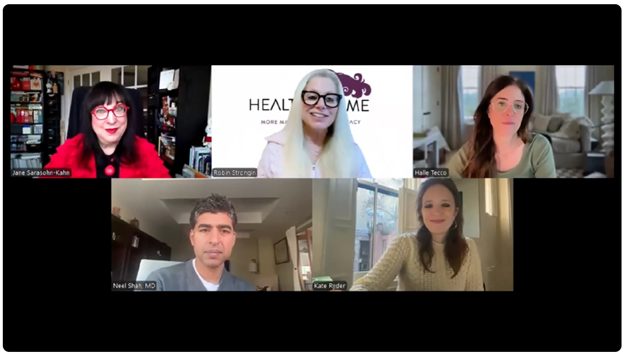 Jane collaborated on
Jane collaborated on